#i miss my trainspotting era
Explore tagged Tumblr posts
Text
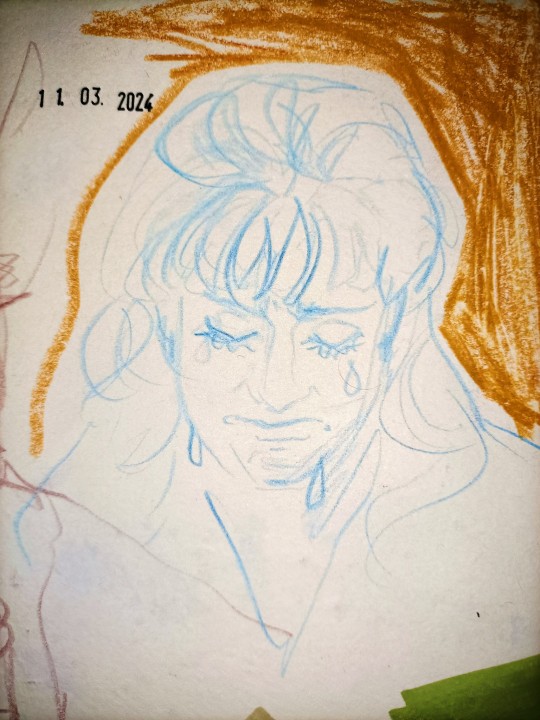


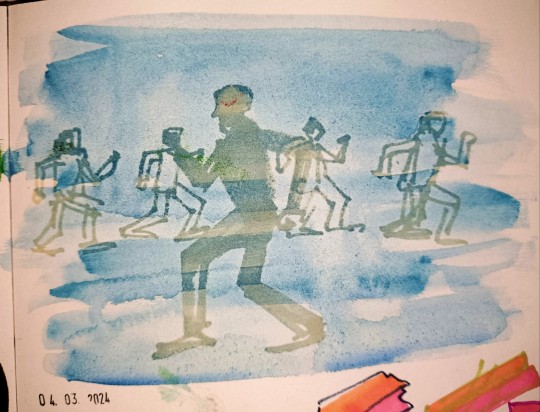

misc art dump misc art dump 🗣️🗣️🗣️
#tomtoms_art#laura palmer fanart#twin peaks fanart#bob marley fanart#renton fanart#trainspotting fanart#david byrne fanart#talking heads fanart#the bride of frankenstein fanart#i miss my trainspotting era#made me draw so much - i wish i was better at drawing back then so i could've execute my ideas better
15 notes
·
View notes
Text
BOOKS
The last 10 books I’ve read:
1. Hallelujah Anyway - Anne Lamott This book should have actually been in the last list of books I’ve read, but I missed it. I’m a bit scatterbrained sometimes, so I keep lists. I have several different lists of “books I’ve read” to try and keep track of where I’m at. Needless to say, I sometimes forget to update one (or more) of the lists and then forget which one is most up-to-date. Anyway. I read this recently, too. I loved her book, “Bird by Bird” but I read it ages ago, when I was at a very different place in my life, spiritually. I forgot that she was so religious and, therefore, found this a little tedious. It wasn’t bad, it just didn’t arrive in my life at the right time like, “Bird by Bird” did. Also, there’s a fantastic album by Hiss Golden Messenger called “Hallelujah Anyhow” and that also got me interested in this book. MC Taylor has recommended books to me in the past and, though he didn’t recommend this one, I wondered if there would be some kind of connection between the two. I didn’t find one.
2. Porno - Irvine Welsh There it is. I finished the sequel. I think if I’d read Trainspotting when it first came out I would’ve been far more interested in reuniting with the cast, but as I went directly from book one to book two, I found it a bit boring. The characters are all pretty well put together and the writing is still good. It’s just the storyline itself that didn’t intrigue me. Simon, aka, “Sick Boy” is now the owner of a sketchy club and decides to try to make a porno film in his establishment to try and go as legitimate as possible. All the other characters kind of play into it, but it’s not as engaging or interesting as the first book. Also, Irvine Welsh’s attempt at writing female characters was, in my opinion, pretty lacking. It wasn’t my favourite but I’ll be speaking on and off in a thick Glaswegian accent for the next while.
3. Sticky Fingers: The Life and Times of Jann Webber and Rolling Stone Magazine - Joe Hagan I’ve always been curious about Rolling Stone magazine. I remember watching Almost Famous for the first time when I was around 17 and falling absolutely in love with the music and that specific time period. I’ve been inspired by that era for a long time and Jann Webber (as a character and the actual person) have small cameos in the film. I remember listening to The Cover of The Rolling Stone by Dr. Hook when I was a teen and dreaming of gracing its cover myself one day. I was always curious why Rolling Stone Magazine existed at the same time as The Rolling Stones and if there was a connection and, it turns out, there really was. I won’t spoil it for you but I was really disappointed. The book itself is well written and engaging but Jann Webber seems to be a very narcissistic power hungry person who had no problem throwing family and friends under the bus if it meant even a smidge more celebrity or power or money for himself. In the same way, it seems he used the magazine as his social club and it was mainly a way for him to become some kind of self-elected gatekeeper of fame. Kind of sad, really.
4. Under the Banner of Heaven - Jon Krakauer I’ve read a bunch of books by Jon Krakauer and I’ve enjoyed them all. Into The Wild, Into Thin Air, etc. They’re captivating books and they’re always very well researched. I was very interested in this book because it’s a true crime story and one of the reviews on the back compared it to “In Cold Blood” by Capote - another true crime story that I was also captivated by. Without really knowing what it was, I bought it from my local used bookstore and dove in. It’s kind of two books in one. Book one deals with a grisly murder committed by two brothers in the 80′s, and the Mormon fanaticism that they embraced which lead them to commit such a heinous crime. Book two explains the history of the Mormon religion. It’s a fascinating look at human nature, at religion, at fanaticism and at the evils that can be committed in god’s name. Not at all a read for the easily disturbed, but a fascinating book if true crime is your cup of tea.
5. Black Wings Has My Angel - Elliott Chase I have a very long list of books on my “to read” list. In fact, I have several “to read” lists scrawled in many different places: on my computer, in a journal, on the back of a receipt, kind of everywhere. I don’t remember where I heard of this book, but I know it was on more than one of my lists. I took a trip over to Vancouver a week ago to do some recording and while I was there I stopped at one of my favourite bookstores and asked one of the clerks for some recommendations similar to Hard Rain Falling and Fat City - both of which I’d read (and loved) after they’d been recommended by the same clerk previously. He grabbed several books and I saw this one in the pile and called it out with excitement. It’s been out of print for a long time but the good folks at New York Review Books have recently reprinted it. I read it in a day and I thoroughly enjoyed it.
6. A Good Man Is Hard To Find - Flannery O’Connor Flannery O’Connor was a fantastic writer. That said, it can be tremendously hard to read her stuff. It’s not how gritty and bleak things are in her stories; it’s not the seemingly infinite amount of unhappy endings, it’s the racism. It’s interesting because she was a highly religious person but her stories and her characters are often non-believers or hypocrites. It’s like she was able to be one thing in life but then able to write from a separate, if not opposite stance. She points out religion’s and society’s flaws and makes you question their motives. She points to the unbelievability of religion and the narrow-mindedness that so often goes hand in hand with a religious outlook. For that, I love her stuff. However, the same cannot be said of her views and her writing on race. The blatant racism in her work mirrors her own personal outlook and it is very hard to get past. And I don’t think it’s appropriate to try to just, “get past” it. You can’t sweep it under the rug. I think it’s important to acknowledge, even though it’s uncomfortable, the two sides to this particular coin. She was a great writer, of that there is no doubt. She was also an avid racist. There’s no doubt there either. But I do think it’s possible to simultaneously hold these two facts and enjoy the art while condemning the artists viewpoint, morals, humanity, language, etc. It requires reading with a critical eye. It means reading things you know you will disagree with, but I would argue that there is great benefit in doing so. Not only can it help you deepen your own understanding of why you believe what you believe, it can also help strengthen your conviction and your grasp of the world and of humanity and of its flaws. For a much better, far more articulate view on O’Connor’s racism in her writing, check out this article from the New Yorker: https://www.newyorker.com/magazine/2020/06/22/how-racist-was-flannery-oconnor
7. In A Lonely Place - Dorothy B. Hughes This was another book in the pile of recommendations from my favourite bookstore. I also read this in one sitting. I’d never heard of it before but it’s fantastic. It’s a fictional story about a murderer in the LA area and from the beginning to the end it’s an exciting read. It’s one of those books that are hard to put down. It’s under 200 pages but it’s a great cat and mouse story. At times, the main characters relationship reminded me a bit of Raskolnikov and the detective from Crime and Punishment. It’s all a game of words. I really enjoyed this one.
8. Why I Am Not A Christian- Bertrand Russell This is a book of essays and some are far more interesting than others. I thoroughly enjoyed the title essay, but essays such as “The Fate of Thomas Paine” were less enjoyable. I’d never read anything by Russell before this. I wasn’t really even aware of him. But, in reading Jon Krakauer’s book, “Under The Banner of Heaven”, I was moved by some of the quotation’s he’d used as introductions to his chapters. More than one quote from this particular book of essay’s was employed. So I picked it up and dove in. It reminded me of Christopher Hitchens’, “God Is Not Great”. It’s clear that essays and philosophers like Russell, if not Russell himself, had a large impact on people like Hitchens and I, for one, am thankful for that. Regardless of where you fall on the pro/anti-religion argument, this is a good book to read. It’s always good to reflect and deepen your understanding of what you do or do not believe and why. Books like this can certainly help to achieve that.
9. The Great Spring - Natalie Goldberg I’ve read a few books by Natalie Goldberg before. I often find that I really enjoy her writing but she comes across as quite cold and even, at points, rude to others. Not all the time, but often enough that it stands out. Still, writers don’t have to be friendly. They don’t have to be anything at all, besides human, I suppose and not all humans are always friendly. It’s beside the point. I like her style and I like her writing so, that’s that.
10. The Innocent Man - John Grisham I might be on a bit of a true crime kick. Under the Banner of Heaven got me into it, I think. This is an absolutely crazy story. After reading it I discovered there’s actually a Netflix docuseries about it. I haven’t checked it out yet. I think I will, but if it stays close to the book it’ll be hard to watch. Not only because of the heinous crimes committed but also because of the complete lack of justice served. It’s a captivating story and at times it’s hard to believe it’s true.
more soon, -joshua
2 notes
·
View notes
Photo
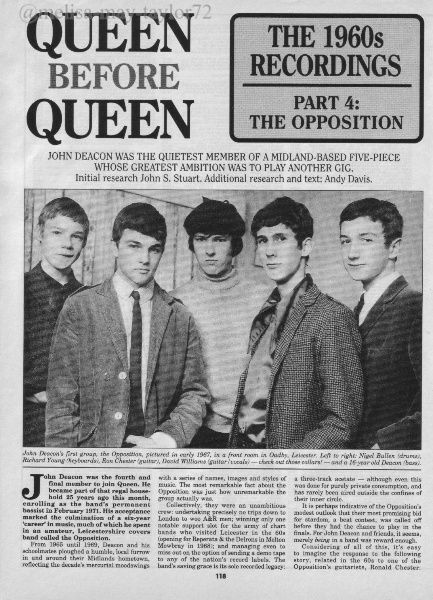
QUEEN BEFORE QUEEN
THE 1960s RECORDINGS
➖➖➖➖➖➖➖➖➖
PART 4:
THE OPPOSITION
JOHN DEACON WAS THE QUIETEST MEMBER OF A MIDLAND-BASED FIVE-PIECE WHOSE GREATEST AMBITION WAS TO PLAY ANOTHER GIG.
Initial research John S. Stuart. Additional research and text: Andy Davis.
John Deacon was the fourth and final member to join Queen. He became part of that regal household 25 years ago this month, enrolling as the band’s permanent bassist in February 1971. His acceptance marked the culmination of a six-year ‘career’ in music, much of which he spent in an amateur, Leicestershire covers band called the Opposition.
From 1965 until 1969, Deacon and his schoolmates ploughed a humble, local furrow in and around their Midlands hometown, reflecting the decade’s mercurial moodswing with a series of names, images and styles of music. The most remarkable fact about the Opposition was just how unremarkable the group actually was.
Collectively, they were an unambitious crew: undertaking precisely no trips down to London to woo A&R men; winning only one notable support slot for the army of chart bands who visited Leicester in the ‘60s (opening for Reperata & the Delrons in Melton Mowbray in 1968); and managing even to miss out on the option of sending a demo tape to any of the nation’s record labels. The band’s saving grace is its solé recorded legacy: a three-track acetate — although even this was done for purely private consumption, and has rarely been aired outside the confines of their inner circle.
It is perhaps indicative of the Opposition’s modest outlook that their most promising bid for stardom, a beat contest, was called off before they had the chance to play in the finals. For John Deacon and friends, it seems, merely being in a band was reward enough.
Considering of all of this, it’s easy to imagine the response to the following story, related in the ‘60s to one of the Opposition’s guitarists, Ronald Chester:...[ ]
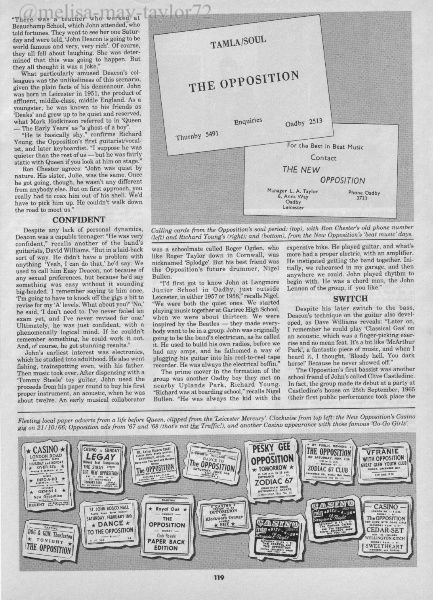
...[ ] “There was a teacher who worked at Beauchamp School, which John attended, who told fortunes. They went to see her one Saturday and were told, ‘John Deacon is going to be world famous and very, very rich. Of course, they all fell about laughing. She was determined that this was going to happen. But they all thought it was a joke."
What particularly amused Deacon’s colleagues was the unlikeliness of this scenario, given the plain facts of his demeanour. John was born in Leicester in 1951, the product of affluent, middle-class, middle England. As a youngster, he was known to his friends as ‘Deaks’ and grew up to be quiet and reserved, what Mark Hodkinson referred to in ‘Queen — ‘The Early Years’ as “a ghost of a boy".
“He is basically shy,” confirms Richard Young, the Opposition’s first guitarist/vocalist, and later keyboardist. “I suppose he was quieter than the rest of us — but he was fairly static with Queen if you look at him on stage.”
Ron Chester agrees: “John was quiet by nature. His sister, Julie, was the same. Once he got going, though, he wasn’t any different from anybody else. But on first approach, you really had to coax him out of his shell. We’d have to pick him up. He couldn’t walk down the road to meet us."
CONFIDENT
Despite any lack of personal dynamics, Deacon was a capable teenager: “He was very confident," recalls another of the band’s guitarists, David Williams. “But in a laidback sort of way. He didn’t have a problem with anything. ‘Yeah, I can do that’, he’d say. We used to call him ‘Easy Deacon’, not because of any sexual preferences, but because he’d say something was easy without it sounding big-headed. I remember saying to him once, I’m going to have to knock off the gigs a bit to revise for my ‘A’ levels. What about you?’ ‘No’, he said, ‘I don’t need to. I’ve never failed an exam yet, and I’ve never revised for one’. Ultimately, he was just confident, with a phenomenally logical mind. If he couldn’t remember something, he could work it out. And, of course, he got stunning results.”
John’s earliest interest was electronics, which he studied into adulthood. He also went fishing, trainspotting even, with his father. Then music took over. After dispensing with a ‘Tommy Steele’ toy guitar, John used the proceeds from his paper round to buy his first proper instrument, an acoustic, when he was about twelve. An early musical collaborator was a school mate called Roger Ogden, who like Roger Taylor down in Cornwall, was nicknamed ‘Splodge’. But his best friend was the Opposition’s future drummer, Nigel Bullen.
“I’d first got to know John at Langmore Junior School in Oadby, just outside Leicester, in either 1957 or 1958,’' recalls Nigel. “We were both the quiet ones. We started playing music together at Gartree High School, when we were about thirteen. We were inspired by the Beatles — they made everybody want to be in a group. John was originally going to be the band’s electrician, as he called it. He used to build his own radios, before we had any amps, and he fathomed a way of plugging his guitar into his reel-to-reel tape recorder. He was always the electrical boffin."
The prime mover in the formation of the group was another Oadby boy they met on nearby Uplands Park, Richard Young. “Richard was at boarding school," recalls Nigel Bullen. “He was always the kid with the expensive bike. He played guitar, and what’s more had a proper electric, with an amplifier. He instigated getting the band together. Initially, we rehearsed in my garage, and then anywhere we could. John played rhythm to begin with. He was a chord man, the John Lennon of the group, if you like."
SWITCH
Despite his later switch to the bass, Deacon’s technique on the guitar also developed, as Dave Williams reveals: “Later on, I remember he could play ‘Classical Gas’ on an acoustic, which was a finger-picking execise and no mean feat. It’s a bit like ‘McArthur Park’, a fantastic piece of music, and when I heard it, I thought, ‘Bloody hell. You dark horse!’ Because he never showed off."
The Opposition’s first bassist was another school friend of John’s called Clive Castledine. In fact, the group made its debut at a party at Castledine’s ouse on 25th September, 1965 (their first public performance took place the...[ ]
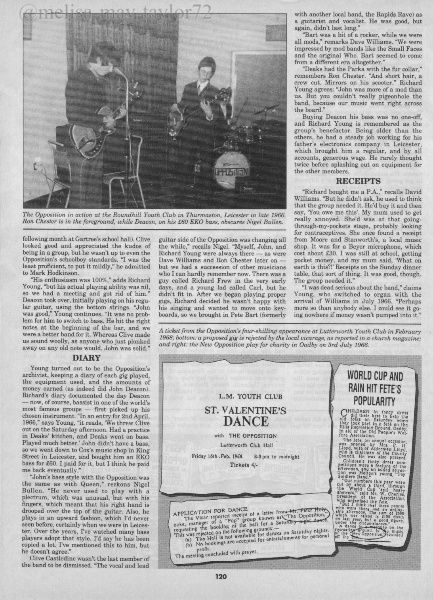
...[ ] following month at Gartree’s school hall). Clive looked good and appreciated the kudos of being in a group, but he wasn’t up to even the Opposition’s schoolboy standards. “I was the least proficient, to put it mildly,” he admitted to Mark Hodkinson.“His enthusiasm was 100%,” adds Richard Young, “but his actual playing ability was null, so we had a meeting and got rid of him.” Deacon took over, initially playing on his regular guitar, using the bottom strings. “John was good,” Young continues. “It was no problem for him to switch to bass. He hit the right notes at the beginning of the bar, and we were a better band for it. Whereas Clive made us sound woolly, as anyone who just plonked away on any old note would, John was solid.”
DIARY
Young turned out to be the Opposition’s archivist, keeping a diary of each gig played, the equipment used, and the amounts of money earned (as indeed did John Deacon). Richard’s diary documented the day Deacon — now, of course, bassist in one of the world’s most famous groups — first picked up his chosen instrument. “In an entry for 2nd April, 1966,” says Young, “it reads, ‘We threw Clive out on the Saturday afternoon. Had a practice in Deaks’ kitchen, and Deaks went on bass. Played much better.’ John didn’t have a bass, so we went down to Cox’s music shop in King Street in Leicester, and bought him an EKO bass for £60. I paid for it, but I think he paid me back eventually.”
“John’s bass style with the Opposition was the same as with Queen,” reckons Nigel Bullen. “He never used to play with a plectrum, which was unusual, but with his fingers, which meant that his right hand is drooped over the top of the guitar. Also, he plays in an upward fashion, which I’d never seen before, certainly when we were in Leicester. Over the years, I’ve watched many bass players adopt that style. I’d say he has been copied a lot. I’ve mentioned this to him, but he doesn’t agree.”
Clive Castledine wasn’t the last member of the band to be dismissed. “The vocal and lead guitar side of the Opposition was changing all the while,” recalls Nigel. “Myself, John, and Richard Young were always there — as were Dave Williams and Ron Chester later on — but we had a succession of other musicians who I can hardly remember now. There was a guy called Richard Frew in the very early days, and a young lad called Carl, but he didn’t fit in. After we began playing proper gigs, Richard decided he wasn’t happy with his singing and wanted to move onto keyboards, so we brought in Pete Bart (formerly with another local band, the Rapids Rave) as a guitarist and vocalist. He was good, but again, didn’t last long.”
“Bart was a bit of a rocker, while we were all mods,” remarks Dave Williams. “We were impressed by mod bands like the Small Faces and the original Who. Bart seemed to come from a different era altogether.”
“Deaks had the Parka with the fur collar,” remembers Ron Chester. “And short hair, a crew cut. Mirrors on his scooter.” Richard Young agrees: “John was more of a mod than us. But you couldn’t really pigeonhole the band, because our music went right across the board”.
”Buying Deacon his bass was no one-off, and Richard Young is remembered as the group’s benefactor. Being older than the others, he had a steady job working for his father’s electronics company in Leicester, which brought him a regular, and by all accounts, generous wage. He rarely thought twice before splashing out on equipment for the other members.
RECEIPTS
“Richard bought me a P.A.,” recalls David Williams. “But he didn’t ask, he used to think that the group needed it. He’d buy it and then say, ‘You owe me this’. My mum used to get really annoyed. She’d was at that going- through-my-pockets stage, probably looking for contraceptives. She once found a receipt from Moore and Stanworth’s, a local music shop. It was for a Beyer microphone, which cost about £30. I was still at school, getting pocket money, and my mum said, ‘What on earth is this?!’ Receipts on the Sunday dinner table, that sort of thing. It was good, though. The group needed it.”
“I was dead serious about the band,” claims Young, who switched to organ with the arrival of Williams in July 1966. “Perhaps more so than anybody else. I could see it going nowhere if money wasn’t pumped into it.”
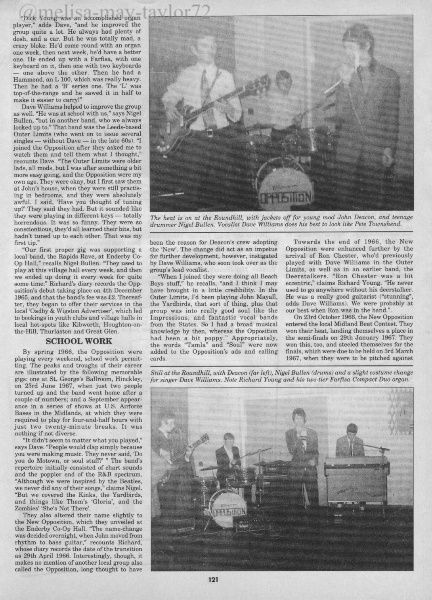
“Dick Young was an accomplished organ player,” adds Dave, “and he improved the group quite a lot. He always had plenty of dosh, and a car. But he was totally mad, a crazy bloke. He’d come round with an organ one week, then next week, he’d have a better one. He ended up with a Farfisa, with one keyboard on it, then one with two keyboards — one above the other. Then he had a Hammond, an L 100. which was really heavy. Then he had a ‘B’ series one. The ‘L’ was top-of-the-range and he sawed it in half to make it easier to carry!”
Dave Williams helped to improve the group as well. “He was at school with us,” says Nigel Bullen, “but in another band, who we always looked up to.” That band was the Leeds-based Outer Limits (who went on to issue several singles — without Dave — in the late ‘60s). “I joined the Opposition after they asked me to watch them and tell them what I thought,” recounts Dave. “The Outer Limits were older lads, all mods, but I was after something a bit more easy going, and the Opposition were my own age. They were okay, but I first saw them at John’s house, when they were still practising in bedrooms, and they were absolutely awful. I said, ‘Have you thought of tuning up?’ They said they had. But it sounded like they were playing in different keys — totally horrendous. It was so funny. They were so conscientious, they’d all learned their bits, but hadn't tuned up to each other. That was my first tip.”
“Our first proper gig was supporting a local band, the Rapids Rave, at Enderby Coop Hall,” recalls Nigel Bullen. “They used to play at this village hall every week. and then we ended up doing it every week for quite some time.” Richard’s diary records the Opposition’s debut taking place on 4th December 1965, and that the band’s fee was £2. Thereafter, they began to offer their Services in the local ‘Oadby & Wigston Advertiser’, which led to bookings in youth clubs and village halls in local hot-spots like Kibworth, Houghton-on- the-Hill, Thurlaston and Great Glen.
SCHOOL WORK
By spring 1966, the Opposition were playing every weekend, school work permitting. The peaks and troughs of their career are illustrated by the following memorable gigs: one at St. George’s Ballroom, Hinckley, on 23rd June 1967, when just two people turned up and the band went home after a couple of numbers; and a September appearance in a series of shows at U.S. Airforce Bases in the Midlands, at which they were required to play for four-and-half hours with just two twenty-minute breaks. It was nothing if not diverse.
“It didn’t seem to matter what you played,” says Dave. “People would clap simply because you were making music. They never said, ‘Do you do Motown, or soul stuff?’ ” The band’s repertoire initially consisted of chart sounds and the poppier end of the R&B spectrum. “Although we were inspired by the Beatles, we never did any of their songs,” claims Nigel. “But we covered the Kinks, the Yardbirds, and things like Them’s ‘Gloria’, and the Zombies’ ‘She’s Not There’.
They also altered their name slightly to the New Opposition, which they unveiled at the Enderby Coop Hall. “The name-change was decided overnight, when John moved from rhythm to bass guitar,” recounts Richard, whose diary records the date of the transition as 29th April 1966. Interestingly, though, it makes no mention of another local group also called the Opposition, long thought to have been the reason for Deacon’s crew adopting the ‘New’. The change did act as an impetus for further development, however, instigated by Dave Williams, who soon took over as the group’s lead vocalist.
“When I joined they were doing all Beach Boys stuff,” he recalls, “and I think I may have brought in a little credibility. In the Outer Limits, I’d been playing John Mayall, the Yardbirds, that sort of thing, plus that group was into really good soul like the Impressions, and fantastic vocal bands from the States. So I had a broad musical knowledge by then, whereas the Opposition had been a bit poppy.” Appropriately, the words “Tamla” and “Soul” were now added to the Opposition’s ads and calling cards.
Towards the end of 1966, the New Opposition were enhanced further by the arrival of Ron Chester, who’d previously played with Dave Williams in the Outer Limits, as well as in an earlier band, the Deerstalkers. “Ron Chester was a bit eccentric,” claims Richard Young. “He never used to go anywhere without his deerstalker. He was a really good guitarist (“stunning”, adds Dave Williams). We were probably at our best when Ron was in the band.”
On 23rd October 1966, the New Opposition entered the local Midland Beat Contest. They won their heat, landing themselves a place in the semifinals on 29th January 1967. They won this, too, and steeled themselves for the finals, which were due to be held on 3rd March 1967, when they were to be pitched against...[ ]
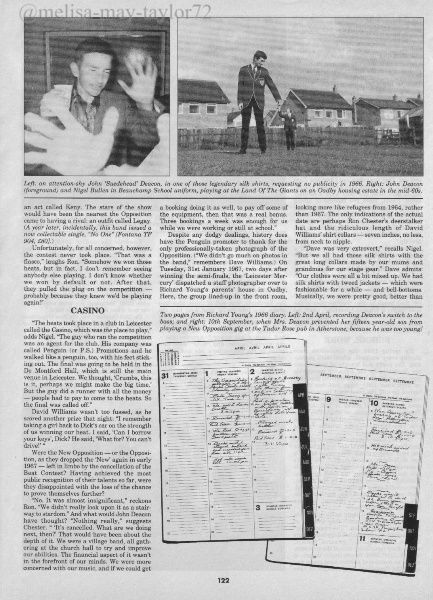
...[ ] an act called Keny. The stars of the show would have been the nearest the Opposition came to having a rival: an outfit called Legay. (A year later, incidentally, this band issued a now collectable single, “No One” (Fontana TF 904,£80J.) Unfortunately, for all concerned, however, the contest never took place. “That was a fiasco,'' laughs Ron. “Somehow we won those heats, but in fact, I don’t remember seeing anybody else playing. I don’t know whether we won by default or not. After that, they pulled the plug on the competition — probably because they knew we’d be playing again!”.
CASINO
“The heats took place in a club in Leicester called the Casino, which was the place to play,” adds Nigel. “The guy who ran the competition was an agent for the club. His company was called Penguin (or P.S) Promotions and he walked like a penguin too, with his feet sticking out. The final was going to be held in the De Montford Hall, which is still the main venue in Leicester. We thought, ‘Crumbs, this is it, perhaps we might make the big time.’ But the guy did a runner with all the money — people had to pay to come to the heats. So the final was called off.”
David Williams wasn’t too fussed, as he scored another prize that night: “I remember taking a girl back to Dick’s car on the strength of us winning our heat. I said, ‘Can I borrow your keys, Dick? He said, ‘What for? You can’t drive!’ “
Were the New Opposition — or the Opposition, as they dropped the ‘New’ again in early 1967 — left in limbo by the cancellation of the Beat Contest? Having achieved the most public recognition of their talents so far, were they disappointed with the loss of the chance to prove themselves further?
“No. It was almost insignificant,” reckons Ron. “We didn’t really look upon it as a stairway to stardom.” And what would John Deacon have thought? “Nothing really,” suggests Chester. “ ‘It’s cancelled. What are we doing next, then?’ That would have been about the depth of it. We were a village band, all gathering at the church hall to try and improve our abilities. The financial aspect of it wasn’t in the forefront of our minds. We were more concerned with our music, and if we could get a booking doing it as well, to pay off some of the equipment, then that was a real bonus. Three bookings a week was enough for us while we were working or still at school.” Despite any dodgy dealings, history does have the Penguin promoter to thank for the only professionally-taken photograph of the Opposition. (“We didn’t go much on photos in the band,” remembers Dave Williams.) On Tuesday, 31st January 1967, two days after winning the semi-finals, the ‘Leicester Mercury’ dispatched a staff photographer over to Richard Young’s parents’ house in Oadby. Here, the group lined-up in the front room, looking more like refugees from 1964, rather than 1967. The only indications of the actual date are perhaps Ron Chester’s deerstalker hat and the ridiculous length of David Williams’ shirt collars — seven inches, no less, from neck to nipple.
“Dave was very extrovert,” recalls Nigel. “But we all had those silk shirts with the great long collars made by our mums and grandmas for our stage gear.” Dave admits: “Our clothes were all a bit mixed up. We had silk shirts with tweed jackets — which were fashionable for a while — and bell-bottoms. Musically, we were pretty good, better than...[ ]
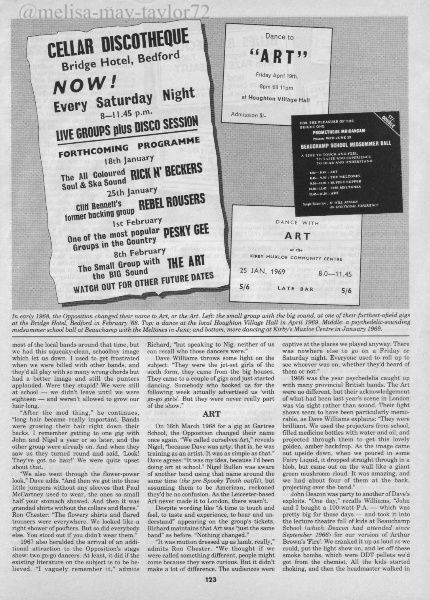
...[ ] most of the local bands around that time, but we had this squeaky-clean, schoolboy image which let us down. I used to get frustrated when we were billed with other bands, and they’d all play with so many wrong chords but had a better image and still the punters applauded. Were they stupid? We were still at school — we didn’t leave until we were eighteen — and weren’t allowed to grow our hair long”.
“After the mod thing,” he continues, “long hair became really important. Bands were growing their hair right down their backs. I remember getting to one gig with John and Nigel a year or so later, and the other group were already on. And when they saw us they turned round and said, ‘Look! They’ve got no hair!’. We were quite upset about that”.
“We also went through the flower-power look,” Dave adds. “And then we got into those little jumpers without any sleeves that Paul McCartney used to wear, the ones so small that half your stomach showed. And then it was grandad shirts without the collars and flares.” Ron Chester: “The flowery shirts and flared trousers were everywhere. We looked like a right shower of poofters. But so did everybody else. You stood out if you didn’t wear them.”
1967 also heralded the arrival of an additional attraction to the Opposition’s stage show: two go-go dancers. At least, it did if the existing literature on the subject is to be believed. “I vaguely remember it,” admits Richard, “but speaking to Nig, neither of us can recal who those dancers were”.
Dave Williams throws some light on the subject: “They were the jet-set girls of the sixth form, they came from the big houses. They came to a couple of gigs and just started dancing. Somebody who booked us for the following week actually advertised us ‘with go-go girls’. But they were never really part of the show.”
ART
On 16th March, 1968 for a gig at Gartree School, the Opposition changed their name once again. “We called ourselves Art,” reveals Nigel, “because Dave was arty, that is, he was training as an artist. It was as simple as that.” Dave agrees: “It was my idea, because I’d been doing art at school.” Nigel Bullen was aware of another band using that name around the same time (the pre-Spooky Tooth outfit), but assuming them to be American, reckoned they’d be no confusion. As the Leicester-based Art never made it to London, there wasn’t.
Despite wording like “A time to touch and feel, to taste and experience, to hear and understand” appearing on the group’s tickets, Richard maintains that Art was “just the same band” as before. “Nothing changed."
“It was mutton dressed up as lamb, really,” admits Ron Chester. “We thought if we were called something different, people might come because they were curious. But it didn’t make a lot of difference. The audiences were captive at the places we played anyway. There was nowhere else to go on a Friday or Saturday night. Everyone used to roll up to see whoever was on, whether they’d heard of them or not.”
1968 was the year psychedelia caught up with many provincial British bands. The Art were no different, but their acknowledgement of what had been last year’s scene in London was via sight rather than sound. Their light shows seem to have been particularly memorable, as Dave Williams explains: “They were brilliant. We used the projectors from school, filled medicine bottles with water and oil, and projected through them to get this lovely golden, amber backdrop. As the image came out upside down, when we poured in some Fairy Liquid, it dropped straight through in a blob, but came out on the wall like a giant green mushroom cloud. It was amazing, and we had about four of them at the back, projecting over the band.”
John Deacon was party to another of Dave’s exploits. “One day,” recalls Williams, “John and I bought a 100-watt P.A. — which was pretty big for those days — and took it into the lecture theatre full of kids at Beauchamp School (which Deacon had attended since September 1966) for our version of Arthur Brown’s ‘Fire’. We cranked it up as loud as we could, put the light show on, and let off these smoke bombs, which were DDT pellets we’d got from the chemist. All the kids started choking, and then the headmaster walked in...[ ]
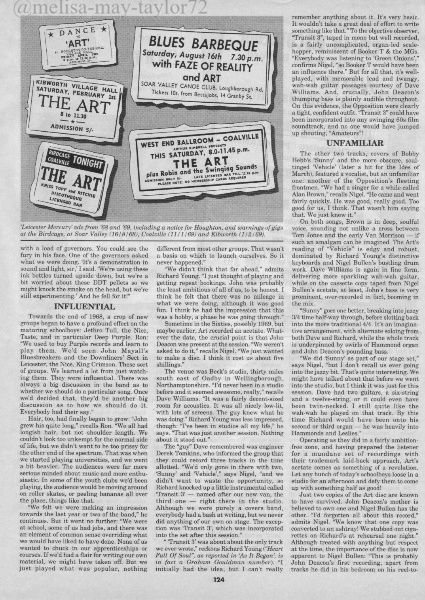
...[ ] with a load of governors. You could see the fury in his face. One of the governors asked what we were doing. ‘It’s a demonstration in sound and light, sir,’ I said. ‘We’re using these ink bottles turned upside down, but we’re a bit worried about these DDT pellets so we might knock the smoke on the head, but we’re still experimenting.’ And he fell for it!”.
INFLUENTIAL
Towards the end of 1968, a crop of new groups began to have a profound effect on the maturing schoolboys: Jethro Tull, the Nice, Taste, and in particular Deep Purple. Ron: “We used to buy Purple records and learn to play them. We’d seen John Mayall’s Bluesbreakers and the Downliners’ Sect in Leicester, the Nice, King Crimson. These sort of groups. We learned a lot from just watching them. They were influential. There was always a big discussion in the band as to whether we should do a particular song. Once we’d decided that, there’d be another big discussion as to how we should do it. Everybody had their say.”
Hair, too, had finally began to grow: “John grew his quite long,” recalls Ron. “We all had longish hair, but not shoulder length. We couldn’t look too unkempt for the normal side of life, but we didn’t want to be too prissy for the other end of the spectrum. That was when we started playing universities, and we went a bit heavier. The audiences were far more serious minded about music and more enthusiastic. In some of the youth clubs we’d been playing, the audience would be moving around on roller skates, or peeling bananas all over the place, things like that”.
“We felt we were making an impression towards the last year or two of the band,” he continues. But it went no further: “We were at school, some of us had jobs, and there was an element of common sense overriding what we would have liked to have done. None of us wanted to chuck in our apprenticeships or courses. If we’d had a flair for writing our own material, we might have taken off. But we just played what was popular, nothing different from most other groups. That wasn’t a basis on which to launch ourselves. So it never happened."
“We didn’t think that far ahead,” admits Richard Young. “I just thought of playing and getting repeat bookings. John was probably the least ambitious of all of us, to be honest. I think he felt that there was no mileage in what we were doing, although it was good fun. I think he had the impression that this was a hobby, a phase he was going through.”
Sometime in the Sixties, possibly 1969, but maybe earlier, Art recorded an acetate. Whatever the date, the crucial point is that John Deacon was present at the session. “We weren't asked to do it,” recalls Nigel. “We just wanted to make a disc. I think it cost us about five shillings.”
The venue was Beck’s studio, thirty miles south east of Oadby in Wellingborough, Northamptonshire. “I’d never been in a studio before and it seemed awesome, really,” recalls Dave Williams. “It was a fairly decent-sized room for acoustics. It was all nicely low-lit, with lots of screens. The guy knew what he was doing.” Richard Young was less impressed, though: I’ve been in studios all my life,” he says. “That was just another session. Nothing about it stood out.”
The “guy” Dave remembered was engineer Derek Tomkins, who informed the group that they could record three tracks in the time allotted. “We’d only gone in there with two, ‘Sunny’ and ‘Vehicle’,” says Nigel, “and we didn’t want to waste the opportunity, so Richard knocked up a little instrumental called Transit 3’ — named after our new van, the third one — right there in the studio. Although we were purely a covers band, everybody had a bash at writing, but we never did anything of our own on stage. The exception was Transit 3’, which was incorporated into the set after this session.”
“ Transit 3’ was about about the only track we ever wrote," reckons Richard Young (“Heart Full Of Soul”, as reported in ‘As It Began’, is in fact a Graham Gouldman nurnber). “I initially had the idea, but I can’t really remember anything about it. It’s very basic. It wouldn’t take a great deal of effort to write something like that.” To the objective observer, “Transit 3”, taped in mono but well recorded, is a fairly uncomplicated, organ-led scale- hopper, reminiscent of Booker T & the MGs.
“Everybody was listening to ‘Green Onions’,” confirms Nigel, “so Booker T would have been an influence there.” But for all that, it’s well- played, with memorable lead and twangy, wah-wah guitar passages courtesy of Dave Williams. And, crucially, John Deacon’s thumping bass is plainly audible throughout. On this evidence, the Opposition were clearly a tight, confident outfit. “Transit 3” could have been incorporated into any swinging ‘60s film soundtrack, and no one would have jumped up shouting, “Amateurs”!.
UNFAMILIAR
The other two tracks, covers of Bobby Hebb’s ‘Sunny' and the more obscure, soul- tinged ‘Vehicle’ (later a hit for the Ides of March), featured a vocalist, but an unfamiliar one: another of the Opposition’s fleeting frontmen. “We had a singer for a while called Alan Brown,” recalls Nigel. “He came and went fairly quickly. He was good, really good. Too good for us, I think. That wasn’t him saying that. We just knew it.”
On both songs, Brown is in deep, soulful voice, sounding not unlike a cross between Tom Jones and the early Van Morrison — if such an amalgam can be imagined. The Art’s reading of “Vehicle” is edgy and robust, dominated by Richard Young’s distinctive keyboards and Nigel Bullen’s bustling drum work. Dave Williams is again in fine form, delivering more sparkling wah-wah guitar, while on the cassette copy taped from Nigel Bullen’s acetate, at least, John’s bass is very prominent, over-recorded in fact, booming in the mix.
“Sunny” goes one better, breaking into jazzy 3/4 time halfway through, before slotting back into the more traditional 4/4. It’s an imaginative arrangement, with alternate soloing from both Dave and Richard, while the whole track is underpinned by swirls of Hammond organ and John Deacon’s pounding bass.
“We did ‘Sunny’ as part of our stage set,” says Nigel, “but I don’t recall us ever going into the jazzy bit. That’s quite interesting. We might have talked about that before we went into the studio, but I think it was just for this session. Dave had two guitars, a six-string and a twelve-string, or it could even have been twin-necked. I still quite like the wah-wah he played on that track. By this time Richard would have been onto his second or third organ — he was heavily into Hammonds and Leslies."
Operating as they did in a fairly ambition- free zone, and having prepared the listener for a mundane set of recordings with their trademark laid-back approach, Art’s acetate comes as something of a revelation. Let any bunch of today’s schoolboys loose in a studio for an afternoon and defy them to come up with something half as good!
Just two copies of the Art disc are known to have survived. John Deacon’s mother is believed to own one and Nigel Bullen has the other. “I’d forgotten all about this record,” admits Nigel. “We know that one copy was converted to an ashtray!. We stubbed out cigarettes on Richards at rehearsal one night.” Although treated with anything but respect at the time, the importance of the disc is now apparent to Nigel Bullen: “This is probably John Deacon’s first recording, apart from tracks he did in his bedroom on his reel-to-...[ ]
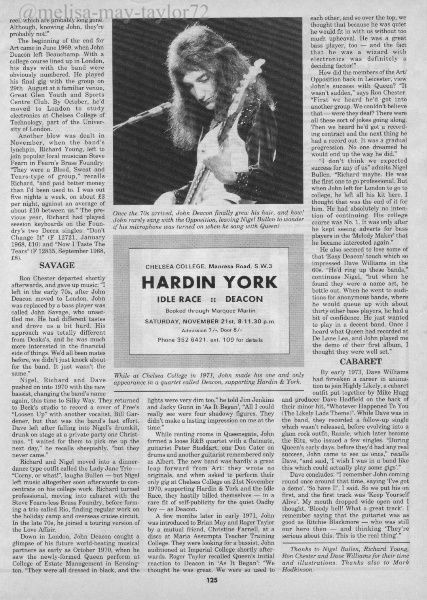
...[ ] reel, which are probably long gone. Although, knowing John, they’re probably not!”
The beginning of the end for Art came in June 1969, when John Deacon left Beauchamp. With a college course lined up in London, his days with the band were obviously numbered. He played his final gig with the group on 29th August at a familiar venue, Great Glen Youth and Sports Centre Club. By October, he’d moved to London to study electronics at Chelsea College of Technology, part of the University of London.
Another blow was dealt in November, when the band's lynchpin, Richard Young, left to join popular local musician Steve Fearn in Fearn’s Brass Foundry.
“They were a Blood, Sweat and Tears-type of group,” recalls Richard, “and paid better money than I’d been used to. I was out five nights a week, on about £3 per night, against an average of about £10 between us.” The previous year, Richard had played session keyboards on the Foundry’s two Decca singles: “Don’t Change It” (F 12721, January 1968, £10) and “Now I Taste The Tears” (F 12835. September 1968, £8).
SAVAGE
Ron Chester departed shortly afterwards, and gave up music: “I left in the early 70s, after John Deacon moved to London. John was replaced by a bass player was called John Savage, who unsettled me. He had different tastes and drove us a bit hard. His approach was totally different from Deaks's, and he was much more interested in the financial side of things. We’d all been mates before, we didn't just knock about for the band. It just wasn’t the same.”
Nigel, Richard and Dave pushed on into 1970 with the new bassist, changing the band’s name again, this time to Silky Way. They returned to Beck’s studio to record a cover of Free’s “Loosen Up” with another vocalist, Bill Gardener, but that was the band’s last effort. Dave left after falling into Nigel’s drumkit, drunk on stage at a private party one Christmas. “I waited for them to pick me up the next day,” he recalls sheepishly, “but they never carne.”
Richard and Nigel moved into a dinner- dance type outfit called the Lady Jane Trio — “Corny, or what!”, laughs Bullen — but Nigel left music altogether soon afterwards to concentrate on his college work. Richard turned professional, moving into cabaret with the Steve Fearn-less Brass Foundry, before forming a trio called Rio, finding regular work on the holiday camp and overseas cruise circuit. In the late ‘70s, he joined a touring version of the Love Affair.
Down in London, John Deacon caught a glimpse of his future world-beating musical partners as early as October 1970, when he saw the newly-formed Queen perform at College of Estate Management in Kensington. “They were all dressed in black, and the lights were very dim too,” he told Jim Jenkins and Jacky Gunn in ‘As It Began’, “All I could really see were four shadowy figures. They didn’t make a lasting impression on me at the time.”
While renting rooms in Queensgate, John formed a loose R&B quartet with a flatmate, guitarist Peter Stoddart, one Don Cater on drums and another guitarist remembered only as Albert. The new band was hardlv a great leap forward from Art: they wrote no originals, and when asked to perform their only gig at Chelsea College on 21st November 1970, supporting Hardin & York and the Idle Race, they hastily billed themselves — in a rare fit of self-publicity for the quiet Oadby boy — as Deacon.
A few months later in early 1971, John was introduced to Brian May and Roger Taylor by a mutual friend, Christine Farnell, at a disco at Maria Assumpta Teacher Training College. They were looking for a bassist. John auditioned at Imperial College shortly afterwards. Roger Taylor recalled Queen’s initial reaction to Deacon in ‘As It Began’: “We thought he was great. We were so used to each other, and so over the top, we thought that because he was quiet he would fit in with us without too much upheaval. He was a great bass player, too — and the fact that he was a wizard with electronics was definitely a deciding factor!”
How did the members of the Art/Opposition back in Leicester, view John’s success with Queen? “It wasn’t sudden”, says Ron Chester. “First we heard he’d got into another group. We couldn’t believe that — were they deaf? There were all these sort of jokes going along. Then we heard he’d got a recording contract and the next thing he had a record out. It was a gradual progression. No one dreamed he would end up the way he did.”
“I don’t think we expected success for any of us" admits Nigel Bullen. “Richard maybe. He was the first one to go professional. But when John left for London to go to college, he left all his kit here. I thought that was the end of it for him. He had absolutely no intention of continuing. His college course was No.1. It was only after he kept seeing adverts for bass players in the ‘Melody Maker’ that he became interested again.”
He also seemed to lose some of that ‘Easy Deacon’ touch which so impressed Dave Williams in the ‘60s. “He’d ring up these bands,” continues Nigel, “but when he found they were a name act, he bottle out. When he went to auditions for anonymous bands, where he would queue up with about thirty other bass players, he had a bit of confidence. He just wanted to play in a decent band. Once I heard what Queen had recorded at De Lane Lea, and John played me the demo of their first album, I thought they were well set.”
CABARET
By early 1973, Dave Williams had forsaken a career in animation to join Highly Likely, a cabaret outfit put together by Mike Hugg and producer Dave Hadfield on the back of their minor hit, “Whatever Happened To You (The Likely Lads Theme)”. While Dave was in the band, they recorded a follow-up single which wasn’t released, before evolving into a glam rock outfit, Razzle, which later become the Ritz, who issued a few singles. “During Queen’s early days, before they’d had any real success, John came to see us once,” recalls Dave, “and said, ‘I wish I was in a band like this which could actually play some gigs’.” Dave concludes: “I remember John coming round once around that time, saying I’ve got a demo’. ‘So have I!’, I said. So we put his on first, and the first track was ‘Keep Yourself Alive’. My mouth dropped wide open and I thought. ‘Bloody hell! What a great track’. I remember saying that the guitarist was as good as Ritchie Blackmore — who was still our hero then — and thinking ‘They’re serious about this. This is the real thing’.”
RECORD COLLECTOR Nº 198 FEBRUARY 1996
⬅PREVIOUS: SMILE
https://melisa-may-taylor72.tumblr.com/post/639672109315014656/queen-before-queen-the-1960s-recordings
➡NEXT: IBEX, WRECKAGE & SOUR MILK SEA
@natromanxoff, @mephisto92, @moviestorian, @x5vale, @39-brian, @onegoldenglance, @crosmopolitan, @an-abyss-called-life, @his-majesty-king-mercury, @i-live-for-queen, @brian-39-may, @toomuchlove-willkillyou, @brimaymay, @sail-away-sweet-sister, @drummerqueenrmt, @old-fashioned-roger-boy, @briianmaay, @inui-mycroft, @deacytits, @iminlovewithrogscar, @drowseoftaylor, @brianmayislongaway, @balticlover, @astrophysicist-guitar-god, @miez-lakatz, @brianmayoucease, @jesus-in-a-life-boat, @aslongasthereismusic, @roger-taylors-car, @silapril, @sherrifanciesfriskyfreddie, @tenderbri, @brianmydear, @thosequeenboys, @millionairewaltz-carpediem, @painandpleasure86, @bribrifrenchfry, @xlucylennonx, @a-night-at-the-abbey-road, @inthedayswhenlandswerefew, @madformeddowstaylor, @queenrogertaylorfan, @let-roger-get-a-lunch, @queen-for-life, @rethought, @drivenbybrianmay @mymakeupmaybeflaking, @old-but-still-a-child, @let-roger-get-a-lunch, @warriorteam1924, @funnydressesweirdhairanddance, @painkiller80, @thefanhuman13, @yourtieddownmother, @hgmercury39, @brimi-stardust, @thefairyfellermercury, @retroromantics, @sailawaysweetbrimi, @sophiaintheskywithdiamonds, @holybrianmaywritingbear, @lydiannode, @39-yellow-daffodils , @ure-gonna-loveme-when-u-seeme, @kaykaybeachgirl, @foxmonkey, @deakysgurl, @redspecialandclogsandcurls, @briansrainbowsocks-deactivated2, @delilahmay39, @ohmybribri, @bless-the-queen, @everythingaboutfreddie, @doitforthevine67, @recordsoftheseventies, @rhysjoejoshtomfarisblog, @tenementfunsterwithpurpleshoes, @drummah-in-a-rocknroll-band, @beatlegirl1968, @maylorsqueen, @autumnscenemcyt, @gralto, @alittlepeoplemagic, @rainbowsockbrian, @frejudy, @drivenbybri, @yourlocalmusicalprostitute, @saik-ava, @omb-xx, @sassymaylor, @somekindofroger, @starlightmay, @freddiemercuryismylife, @sunshine112, @chrysochromulina, @glitteryloveravenue, @deakyislife51, @0-primejive-0, @just-a-skinny-lad, @bluewillowmom, @sassiesillie, @stesichoreanpalinode, @farrokhbulsaramercury, @tayloredofqueen, @rushingheadlong, @izzy-is-slightly-mad, @scandalacious, @0-my-fairy-queen-0 @39-volunteers-to-space@zodiacaldust, @deakytaylor, @queenband70s, @deakyeveryday, @drivenbybrimay @70smay
201 notes
·
View notes
Photo
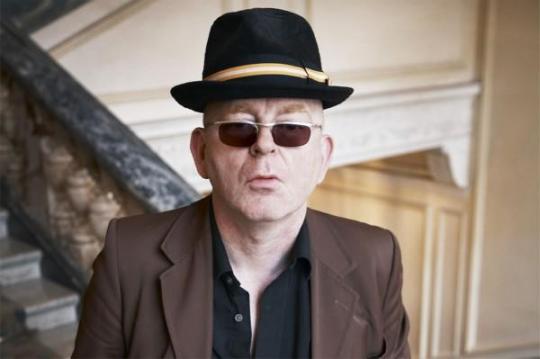
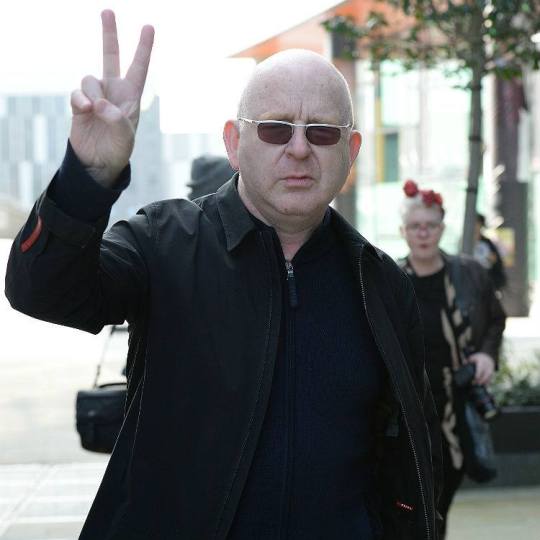


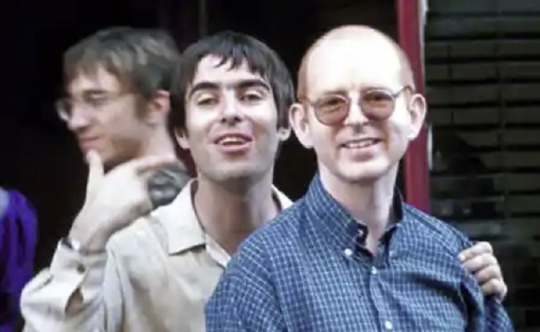


Happy Birthday Alan McGee born 29 September 1960 in East Kilbride.
Alan grew up in Glasgow and attended King's Park Secondary School, where he met future Primal Scream founder Bobby Gillespie. McGee left school at 16 with one O grade McGee and Gillespie were heavily into punk rock, and they joined a local punk band, The Drains, in 1978.
McGee went on from there to found a successful club, The Living Room, in London, then buoyed by the success of their club, McGee funded the record label Creation, with two friends. Named after the ‘60s mod rock outfit, Creation Records’ first release was by the Legend! It was a 7" so bad that McGee reportedly hid most of the records underneath his bed, eventually melting them down after a dispute with the band.
He then signed up The Jesus & Mary Chain to his fledgling label. Due to their quite timely sound and some major championing from the star-making NME, the Mary Chain’s “Upside Down” was Creation’s first outright hit single, spending seven weeks atop the U.K. indie charts. Although the band eventually signed to the major subsidiary Blanco y Negro, McGee was able to reinvest the profits which provided them with enough to sign a string of artists who enjoyed success in the Indie charts. Primal Scream’s Screamadelica was a major breakthrough for McGee and the label.
Not the most financially astute man McGee was still losing money, even after he sold 49% of Creation to Sony the signing of bands like Sugar, the Boo Radleys, Teenage Fanclub should have helped but didn’t.
Things only changed when a band from Manchester fronted by a pair of brothers forced their way on-stage at a gig in Glasgow attended by McGee. Impressed by their attitude, he signed Oasis on the spot, resulting in a partnership that would launch both the band and the label into previously unimaginable success. Thanks to the deal in place with Sony, which quickly moved to shape up the anything-goes business style of the Creation offices, Oasis released a series of singles and a debut album that were met with pandemonium across the globe.
McGee a brick wall however when the hectic life of running a successful label and the years of high stress and out-of-control drug use saw him suffering a complete nervous breakdown. He spent the next two years in recovery. He gradually became less and less involved in Creation as Sony executives took over the label.
Alan McGee’s role in shaping British musical culture over the past thirty years is hard to overstate. As the founder of Creation Records he brought us the bands that defined an era. A charismatic Glaswegian who partied just as hard as any of the acts on his notoriously hedonistic label, he became an infamous character in the world of music.McGee continues to have an impact on independent music like perhaps no other, he has been managing bands in recent years including The Jesus and Mary Chain and The Happy Mondays, in 2018 he launched a new record label, Creation23 saying “I want to put records out again…I’ve missed it, 23 is my lucky number”
Bobby Gillespie sums Alan McGee up nicely “McGee was our Malcolm McLaren and Tony Wilson. An instigator and motivator, a born up setter. I’ve never met anyone like him and neither have you.”
Alan admits that during those years ‘We all took too many drugs, my behaviour was quite mad’ In a recent interview he says I'm glad I'm sober and not an absolute nut job
McGee’s autobiography, Creation Stories, was optioned by Burning Wheel Productions and was adapted into a film screenplay by Monday’s birthday boy Irvine Welsh and Dean Cavanagh. Ewen Bremner, best known as Spud in Trainspotting, takes the central role, Danny Boyle is executive producer.
It’s an “okay” film, definitely not of the standard of Trainspotting, but as you would expect with Bremner in the lead role, it raises a few laughs. Richard Jobson plays Alan’s father, Welsh, as usual makes a cameo appearance.
5 notes
·
View notes
Note
If you could cast any Holmes actor for the role of Raffles, which one would you choose? Could you imagine any Watson actor as Bunny?
Ooh interesting ask! I would love to hear others' thoughts on this too. I kind of want to consider them all xD or at least the ones I've seen the most of, if i may....
Ronald Howard is the first one to come to mind, i think bc of his curly hair and the mischievous nerdiness of his Holmes. He doesn't have enough darkness or edge that i think a Raffles should have, so he's not my pick.
I have wondered what Jeremy Brett would be like as Raffles, of course! I could see An Ideal Husband (1969) era Jeremy as a good movie Raffles. Beautiful, nimble, and a bit naughty and quirky.
Yuko Takeuchi (Rest in Peace) would be excellent. She's funny, an aesthetic snob, and can run in heels which feels like something our athletic Raffles would be able to do. Her Sherlock cares deeply about her Watson/Wato (played by Shihori Kanjiya who would be perfect as Bunny btw). I and many others headcanon Miss Sherlock as autistic, and i think that could be really interesting for the character of Raffles. Raffles and Bunny's relationship is messy with lots of back and forth, like Sherlock and Wato. And some find Raffles to be cold and inconsiderate but he's really not--and that's something a lot of autistic people are faced with, sadly.
RDJ would do a good job and he'd make a fun Raffles but he's starred in so many things, I'd rather see Raffles played by someone who hasn't had a big breakout role yet. Perhaps 90s RDJ?
Vasily Livanov i think would be the best Raffles out of all these! Based a lot on his looks tbh 😂 i meannnnn
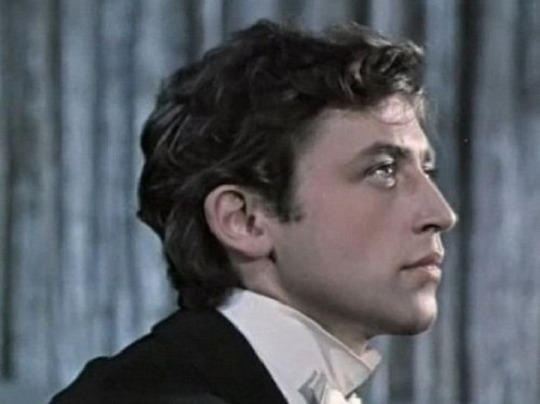
That is a Raffles face if i ever saw one. His Holmes was also a playful nerd 👏 and i can totally see him as a cricketer, an artist, and a jewel thief. 👑
Benedict Cumberbatch has the eyes, the physicality, and the sexiest voice, but i want to say that like RDJ he's played some bigger roles and is maybe too famous for my liking to play Raffles. Sherlock or pre-Sherlock era Ben would be a skinny nerd Raffles and I'd love that :D
Jonny Lee Miller: I've only seen 2 episodes of Elementary and I'm more familiar with him as Sick Boy in Trainspotting. Based on that i think he was quite Raffles-ish (and Renton was Bunny-ish), a thief, a sensitive bad boy, a punk who eventually finds a way to live an outwardly respectable lifestyle as a criminal. He could be a good Raffles.
Robert Stephens: he had the classical background and also was good at comedy, handsome, athletic looking...i *think* i saw him in a cricket scene with Tim Curry in an old movie.. He'd be a capable Raffles.
Tl;dr: Vasily Livanov 💎
Who would you pick?
#anon asks#crime and cricket#sherlock holmes actors#raffles#tdt rambles#this was longer than it needed to be! it's cold today and i don't want to get up xD#anyway this is fun thanks!
36 notes
·
View notes
Note
what are your favorite books in order and y
also describe your dream home
ooo tysm for sending! this got a little long oops
fav books (this was HARD and i got them in order as best i could): the long walk by stephen king. first sk book i ever read (at age 11 lmao, thx dad) that started my love for his work. love the characters to bits, love it’s morbid, love the homo undertones (rly bold for when it came out). i’ve read this book a dozen times or more. gotta say, have never been satisfied with the ending.
trainspotting by irvine welsh. the only book i’ve read again immediately after finishing it for the first time (in part bc i had the slang down real well lol). what can i say i love them fucked up lads and i thought how it was written was fun and unique and i went on to read almost ALL of welsh’s books bc of it. i have one signed copy of filth and a first edition of marabou stork nightmares (both thrifted!)
harry potter and the halfblood prince by jkr (yes i still enjoy hp, no i do not enjoy jkr). it’s been several years since i read the books but i know i reread this one more than the others. i love the amount of backstory that gets revealed about tom riddle and the marauder era too.
invisible monsters by chuck palahniuk. out of all the works i’ve read by him this is my favorite (i’ve read stupid amount of his books, too). i personally did not catch on to the plot twist. i loved the non-linear storytelling. his characters are always so memorable. obv he is most well known for fight club (which i also love), but this book is his best one.
music for torching by a.m. homes. idk what to call the genre, but idk uhhh realistic-ish people contemporary fiction novels are my favs and all of her works are like that. just normal people living their fucked up lives with their secrets. i remember the end of this book pissing me off lmao
asylum by patrick mcgrath. this book was just wild, least that’s what i remember of it (read it 10 years ago). i could not put it down and is probably the closest i’ll get to reading a romance novel... you may have guessed the romance in it is unconventional lmao
okay i have a ton more but without my book collection unpacked this is what i’m offering lol. ugh damn i miss how prolifically i used to read
my dream house... is more or less my dad’s beach house ngl. small and cozy, fireplace (well, it has a wood burning stove), open floor plan for communal area, in a remote nature-y location on the coast and near the beach. i’d add a hot tub. and i’d want a garden.
2 notes
·
View notes
Text
This is such a great interview....god, I miss Bobby. I’ve posted this because otherwise you need to be a subscriber...
I have to be honest, picturing Bobby doing this particular yoga pose makes me need to take a cold shower, lol. The part about his kids asking if he’s going to leave them is heartbreaking ....😭😭. I do love that he’s still baking...
************************
Every Sunday morning the actor Robert Carlyle grabs his mat and heads off for a session of “restorative yoga” in the Canadian port city of Vancouver, where he lives. There is one particular pose — called a “chest-opener”; you lie back, arms supported by bolsters, and release stress and feelings through the abdomen — that has produced remarkable results.
“You hold the pose for up to nine minutes and it releases emotions,” he says. “Out of nowhere I remembered this old lady leading me through the streets of Drumchapel in Glasgow when I was about seven years old, to go to see some wrestling. I hadn’t remembered her since I was a kid. I just lay there crying.”
Carlyle was brought up by his father, Joe, after his mother, Elizabeth, walked out to be with another man when he was four. His father was a painter and decorator, and the pair lived an itinerant existence around the UK in communes, shared houses and even tents. They lived in almost 100 homes. The old woman was his grandmother, Jean, who stepped in to help sometimes.
“That’s what set me off,” Carlyle says. “The realisation that this old woman was my dad’s mum, born in 1895 and survivor of two world wars. And here she was in her seventies, looking out for me when my dad was struggling to get to work.”
Carlyle left school at 16 and followed his father into painting and decorating. Aged 22, he discovered acting and, without formal training, appeared in The Hard Man, Tom McGrath’s play about the notorious Glasgow gangster Jimmy Boyle. After this he was encouraged to enrol at the Royal Scottish Academy of Music and Drama (now the Royal Conservatoire of Scotland).
In the early 1990s he made a name for himself in the ITV detective series Cracker, as well as playing Begbie, the charismatic psycho in the screen adaptation of Irvine Welsh’s novel Trainspotting. Carlyle was lauded as a raw talent able to articulate a new “dirty realism”, although it was his role in the 1997 stripper comedy The Full Monty and as James Bond’s ex-KGB nemesis Renard in the 1999 film The World is Not Enough that catapulted him to international stardom.
“I went through a stage of being very angry about my mother, and that helped to fuel some of those roles,” he says. “As for Begbie in Trainspotting, that was partly me and partly the odd genuine psycho I had encountered in Glasgow.”
At the height of his fame in the 1990s Carlyle was at the centre of Cool Britannia and simultaneously friends with Damon Albarn from Blur and Noel Gallagher, then in Oasis (Carlyle appeared in the video for the single Little By Little). Tony Blair even recommended him for an OBE in the 1998 new year’s honours list. And yet, while at drama school Carlyle feared he might never get work because he wasn’t “posh”.
Now he has come full circle because he is about to play the fictional British prime minister Robert Sutherland in the new six-part Sky drama series Cobra. “Before I opened the script, I actually thought it was about a snake,” he says. “That’s what living away from home does to you.”
Cobra in fact refers to the Cabinet Office Briefing Rooms, the government’s crisis centre where national emergencies from terrorist attacks to natural disasters are handled. In this case the threat comes from a geomagnetic storm resulting from a solar flare that is threatening the worldwide electrical infrastructure. Kettles stop boiling. Cities go dark. Planes drop from the sky.
Carlyle is rigorous in his preparation for roles. When cast as a bus driver in Ken Loach’s 1996 film Carla’s Song he qualified as one. “For a working-class guy from Glasgow, being a prime minister was always going to be challenging,” he says. “I listened to tapes of posh Scottish MPs like [the former foreign secretary] Sir Malcolm Rifkind. He’ll sound like a Scot most of the time, but there are certain turns of phrase when you think, ‘Are you sure this guy is for real?’”
Keen-eyed viewers will have seen Carlyle in the BBC’s adaptation of HG Wells’s The War of the Worlds as the “potentially gay” astronomer Ogilvy. But perhaps only true aficionados will have spotted him as John Lennon in the Beatles tribute film Yesterday. He appeared as a counterfactual, 78-year-old Lennon enjoying his dotage in a bungalow by the sea. Paul McCartney and Ringo Starr approved, but Lennon’s widow Yoko Ono wasn’t happy. “She didn’t like the idea of people seeing John get old, which I understand, but [the director] Danny Boyle argued that John is revered public property,” Carlyle says.
Carlyle wouldn’t accept a credit for the role. “That felt like too much. The chance to play a hero was enough. I don’t think it hurts to occasionally do things for love.”
Lennon’s relationship with his mother, Julia, was fractured too of course, and after a turbulent adolescence and having reached the top of his professional game, Carlyle came to yearn for a family. “I could go anywhere and have anything. [The 1990s] were an extraordinary time. But even then, I was quite a shy person, and I wanted kids and a home and a wife. Every day I am thankful that I found the most fantastic woman to do that with.”
Carlyle met his wife, the make-up artist Anastasia Shirley, while working on Cracker, and they have three children: Ava, 17, Harvey, 15, and Pearce, 13. After ten years in Vancouver, where Carlyle was making the US series Once Upon a Time, his children consider themselves Canadian. Sometimes they ask about his upbringing, an era referred to as his “black and white years”. “‘Dad, tell us about the black and white years,’ they say. It’s pretty heavy telling children about your mother leaving because they look frightened and say, ‘Are you going to bugger off as well?’ When I’ve reassured them, they just look sad. So I say to them, ‘Don’t be sad for me, I got all the love I ever needed. I don’t feel angry or aggrieved. It was her that missed out.’”
Carlyle’s father died of a heart attack in 2006, and in an attempt to work through his grief Carlyle embarked on a tour of the homes they shared together. “That tour was about confirming I had lived that life,” he says. “I’ve been honoured at Buckingham Palace. I’ve done a Bond movie. But I’ve also slept rough with my old man under Brighton pier. It can mess with your head. Going back reminded me where I’m from. I sat in the car weeping.”
For now the family remain in Canada while the children complete their schooling. At weekends he takes them to football, bakes bread (Carlyle taught himself after discovering that Lennon was an accomplished home baker) and the family sometimes go for walks in a local forest.
He celebrated New Year’s Eve in Scotland with his old friend Robert del Naja from Massive Attack and, sooner or later, the family will return for good. It’s striking that Carlyle has not lost his accent. “You don’t lose the accent unless you want to,” he says with a smile. “I love our life in Canada. It’s a beautiful country with beautiful people. But I only have to do a couple of yoga poses to know I’ve got a lot of Britain still inside of me.”
All episodes of Cobra are available from January 17 on Sky One and NOW TV
ROBERT CARLYLE’S PERFECT WEEKEND
Trainspotting or stamp collecting?
Neither — football
Independence or unity?
Unity and collaboration, always
Glasgow or Sheffield?
Glasgow
Green juice for breakfast or the full monty?
Full monty
Night in or night out?
Night in
Last film you saw?
Joker
Country walk or personal trainer?
Country walk
How many unread emails in your inbox?
Around 2,000
What’s your signature dish?
Pasta
I couldn’t get through my weekend without . . .
Football
106 notes
·
View notes
Text
Get to Know Me Tag !
Thank you for tagging me @monsterfuneral !! :)
Favorite Movie/s: the lost boys, my own private idaho, apocalypse now, donnie darko, perks of being a wallflower, ghost world, dazed and confused, the lighthouse, the witch, hereditary, taxi driver, evil dead, evil dead 2, no country for old men, goodwill hunting, ferris buellers day off, breakfast club, rango, near dark, bill and teds excellent adventure, 2001 a space odyssey, chinatown, trainspotting, blade runner, blade runner 2049, benny and joon, matilda, stand by me OK I WILL SHUT UP NOW BUT THERES MORE LOL IM DEFINITELY FORGETTING MANY
Favorite Band/s: the cure, cocteau twins, galaxie 500, the smiths (yeah. i know u_u and yes i hate morrissey), car seat headrest, new order, joy division, depeche mode, jessica pratt, mazzy star, sufjan stevens, simon and garfunkel, fleetwood mac, the velvet underground, the doors, the cranberries, alex g, suicide, teen suicide (lol um yeah), sonic youth, björk (ok yeah i ramble too much I’m sorry)
Favorite Decade: this is from a pop culture / movie + music appreciation perspective and historical fascination with a critical lens- but basically the vietnam war era is fascinating to me 60s-70s (that and the civil rights movement and a lot of other upheaval and change yeah) - also love that time period musically and cinematic (especially the 70s), but also 80s very much as well lol
Day or Night: night! i literally am partially nocturnal i can’t function until after 6 pm
Nicknames: idk lol maybe “booger” counts, it’s what i kind of go by these days lol but it started as a nickname for my minecraft username bc i play a lot with friends lol
Zodiac: virgo sun, aries moon, capricorn rising!
MBTI: intp !
Favorite Vehicle: i know absolutely zero about cars but whatever is old and beat up yeah , not old like classy, old as in worn out and beat up
Pets: i have a cat named betty boop who i love and miss more than anything since im abroad for school u_u
I will tag ..... @mulletlover69 @bogusted and @markosupremacy perhaps idk if you want
5 notes
·
View notes
Link
Every Sunday morning the actor Robert Carlyle grabs his mat and heads off for a session of “restorative yoga” in the Canadian port city of Vancouver, where he lives. There is one particular pose — called a “chest-opener”; you lie back, arms supported by bolsters, and release stress and feelings through the abdomen — that has produced remarkable results.
“You hold the pose for up to nine minutes and it releases emotions,” he says. “Out of nowhere I remembered this old lady leading me through the streets of Drumchapel in Glasgow when I was about seven years old, to go to see some wrestling. I hadn’t remembered her since I was a kid. I just lay there crying.”
Carlyle was brought up by his father, Joe, after his mother, Elizabeth, walked out to be with another man when he was four. His father was a painter and decorator, and the pair lived an itinerant existence around the UK in communes, shared houses and even tents. They lived in almost 100 homes. The old woman was his grandmother, Jean, who stepped in to help sometimes.
“That’s what set me off,” Carlyle says. “The realisation that this old woman was my dad’s mum, born in 1895 and survivor of two world wars. And here she was in her seventies, looking out for me when my dad was struggling to get to work.”
Carlyle left school at 16 and followed his father into painting and decorating. Aged 22, he discovered acting and, without formal training, appeared in The Hard Man, Tom McGrath’s play about the notorious Glasgow gangster Jimmy Boyle. After this he was encouraged to enrol at the Royal Scottish Academy of Music and Drama (now the Royal Conservatoire of Scotland).
In the early 1990s he made a name for himself in the ITV detective series Cracker, as well as playing Begbie, the charismatic psycho in the screen adaptation of Irvine Welsh’s novel Trainspotting. Carlyle was lauded as a raw talent able to articulate a new “dirty realism”, although it was his role in the 1997 stripper comedy The Full Monty and as James Bond’s ex-KGB nemesis Renard in the 1999 film The World is Not Enough that catapulted him to international stardom.
“I went through a stage of being very angry about my mother, and that helped to fuel some of those roles,” he says. “As for Begbie in Trainspotting, that was partly me and partly the odd genuine psycho I had encountered in Glasgow.”
At the height of his fame in the 1990s Carlyle was at the centre of Cool Britannia and simultaneously friends with Damon Albarn from Blur and Noel Gallagher, then in Oasis (Carlyle appeared in the video for the single Little By Little). Tony Blair even recommended him for an OBE in the 1998 new year’s honours list. And yet, while at drama school Carlyle feared he might never get work because he wasn’t “posh”.
Now he has come full circle because he is about to play the fictional British prime minister Robert Sutherland in the new six-part Sky drama series Cobra. “Before I opened the script, I actually thought it was about a snake,” he says. “That’s what living away from home does to you.”
Cobra in fact refers to the Cabinet Office Briefing Rooms, the government’s crisis centre where national emergencies from terrorist attacks to natural disasters are handled. In this case the threat comes from a geomagnetic storm resulting from a solar flare that is threatening the worldwide electrical infrastructure. Kettles stop boiling. Cities go dark. Planes drop from the sky.
Carlyle is rigorous in his preparation for roles. When cast as a bus driver in Ken Loach’s 1996 film Carla’s Song he qualified as one. “For a working-class guy from Glasgow, being a prime minister was always going to be challenging,” he says. “I listened to tapes of posh Scottish MPs like [the former foreign secretary] Sir Malcolm Rifkind. He’ll sound like a Scot most of the time, but there are certain turns of phrase when you think, ‘Are you sure this guy is for real?’”
Keen-eyed viewers will have seen Carlyle in the BBC’s adaptation of HG Wells’s The War of the Worlds as the “potentially gay” astronomer Ogilvy. But perhaps only true aficionados will have spotted him as John Lennon in the Beatles tribute film Yesterday. He appeared as a counterfactual, 78-year-old Lennon enjoying his dotage in a bungalow by the sea. Paul McCartney and Ringo Starr approved, but Lennon’s widow Yoko Ono wasn’t happy. “She didn’t like the idea of people seeing John get old, which I understand, but [the director] Danny Boyle argued that John is revered public property,” Carlyle says.
Carlyle wouldn’t accept a credit for the role. “That felt like too much. The chance to play a hero was enough. I don’t think it hurts to occasionally do things for love.”
Lennon’s relationship with his mother, Julia, was fractured too of course, and after a turbulent adolescence and having reached the top of his professional game, Carlyle came to yearn for a family. “I could go anywhere and have anything. [The 1990s] were an extraordinary time. But even then, I was quite a shy person, and I wanted kids and a home and a wife. Every day I am thankful that I found the most fantastic woman to do that with.”
Carlyle met his wife, the make-up artist Anastasia Shirley, while working on Cracker, and they have three children: Ava, 17, Harvey, 15, and Pearce, 13. After ten years in Vancouver, where Carlyle was making the US series Once Upon a Time, his children consider themselves Canadian. Sometimes they ask about his upbringing, an era referred to as his “black and white years”. “‘Dad, tell us about the black and white years,’ they say. It’s pretty heavy telling children about your mother leaving because they look frightened and say, ‘Are you going to bugger off as well?’ When I’ve reassured them, they just look sad. So I say to them, ‘Don’t be sad for me, I got all the love I ever needed. I don’t feel angry or aggrieved. It was her that missed out.’”
Carlyle’s father died of a heart attack in 2006, and in an attempt to work through his grief Carlyle embarked on a tour of the homes they shared together. “That tour was about confirming I had lived that life,” he says. “I’ve been honoured at Buckingham Palace. I’ve done a Bond movie. But I’ve also slept rough with my old man under Brighton pier. It can mess with your head. Going back reminded me where I’m from. I sat in the car weeping.”
For now the family remain in Canada while the children complete their schooling. At weekends he takes them to football, bakes bread (Carlyle taught himself after discovering that Lennon was an accomplished home baker) and the family sometimes go for walks in a local forest.
He celebrated New Year’s Eve in Scotland with his old friend Robert del Naja from Massive Attack and, sooner or later, the family will return for good. It’s striking that Carlyle has not lost his accent. “You don’t lose the accent unless you want to,” he says with a smile. “I love our life in Canada. It’s a beautiful country with beautiful people. But I only have to do a couple of yoga poses to know I’ve got a lot of Britain still inside of me.”
All episodes of Cobra are available from January 17 on Sky One and NOW TV
ROBERT CARLYLE’S PERFECT WEEKEND
Trainspotting or stamp collecting?
Neither — football
Independence or unity?
Unity and collaboration, always
Glasgow or Sheffield?
Glasgow
Green juice for breakfast or the full monty?
Full monty
Night in or night out?
Night in
Last film you saw?
Joker
Country walk or personal trainer?
Country walk
How many unread emails in your inbox?
Around 2,000
What’s your signature dish?
Pasta
I couldn’t get through my weekend without . . .
Football
#robert carlyle#rc interviews#yoga#vancouver#family#rc photoshoots#GODS HE LOOKS SO GOOD#love that jacket
13 notes
·
View notes
Text

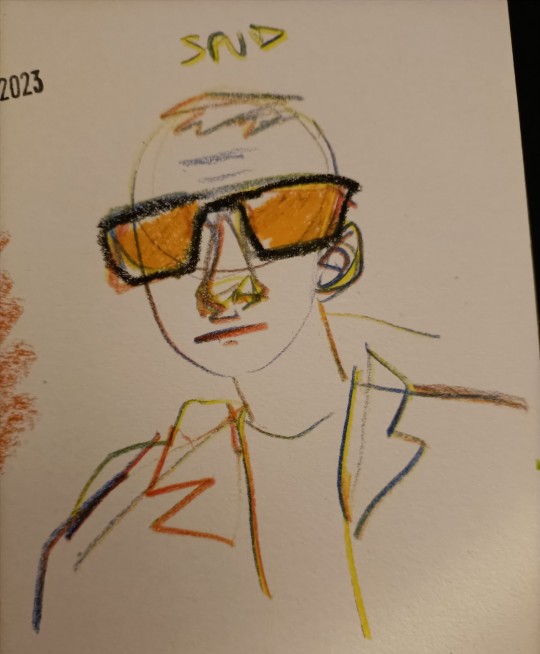
da boys!!!!!!!!
#tomtoms_art#trainspotting#trainspotting fanart#renton#renton fanart#trainspotting renton#trainspotting renton fanart#spud fanart#trainspotting spud fanart#ewan & ewen my beloved#i miss my trainspotting hyperfixation era
15 notes
·
View notes
Text
Been thinking back over the RDR2 single-player campaign.
Something that jumped out at me – Rockstar games always had a strong sense of time and place but they used to filter that through preexisting movies about the setting and now they take on that first-order role and treat history directly, and that’s a big change
GTA3 was New York crime as filtered through Coppola and Scorcese and other gangster movies; Vice City was Scarface and Miami Vice. San Andreas lifted its aesthetics from gangsta rap and Hughes brothers movies. Even RDR1 leaned heavy on Peckinpah and spaghetti westerns
(Bully, I suppose, comes off as an entry in the British “school days” novel genre from someone who grew up in Trainspotting-era Manchester, transposed to the United States)
But starting with GTA4 it feels like they decided to try to grab the zeitgeist barehanded and honestly? I’m not sure it works. 4’s “modern New York, with immigrants shaped by post-Soviet chaos” is a real thing, but not really a resonant thing. In 5 Franklin’s lament that people still have an image of south LA as mid-90s ghetto while it’s solidly lower-middle-class and climbing is accurate but doesn’t really build into something; Trevor and Michael could be a metacommentary on the two traditional threads in Rockstar vidya - anarchic violence and domesticated interior plot - if you squint, but you have to squint.
I noticed this thinking of how RDR2 checked off so many boxes on “what was happening in late-19th cen America as the frontier closed” - you’ve got your Chinese workers building a railroad over here, your reintegration of the unchastened South over here, your resource magnates consolidating here, your German immigration important to the Great Plains here, your native tribes (who integrated freemen after emancipation) being moved on again from first-wave reservations here...
It’s probably newer (or more easily missed) to people w/o my interest in American history, and more subtle and better done than a lot of contemporary AAA stuff – in a lot of cases there’s a parallelism to Arthur and his band that’s used to play with things, one mission sequence is retrieving things for a dispossessed old man and it really leans into his self-pity and what he’s lost but the final twist is he was a slavecatcher and Arthur’s righteously angry, y’know his band idealizes freedom; and anyway a bit later you’re mourning the good old days of freedom... to be a bandit... in between breaking lives for economic reasons and capturing fugitives... it’s like “oh, hm”
But still for all that it’s box checking - yeah, we fit that in, and it just builds up into a pile, and I think it could’ve made a good revisionist Western out of any one of those things instead
(Well it does have heist movie pacing, like GTAV did, that’s something)
(alt.: it’s plenty Scorcese, just later indulgent Gangs of New York/The Aviator Scorcese)
16 notes
·
View notes
Text
Glen Coco’s Top 10 Films of 2017
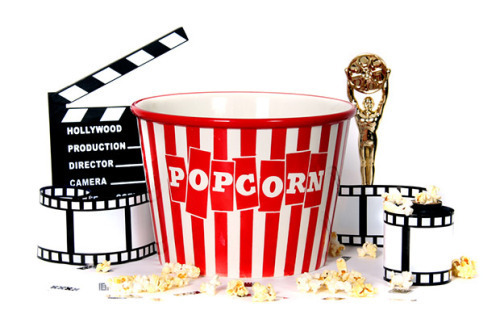
Unlike last year, 2017 was a stand-out for the film industry. There wasn’t an abundance of undisputed masterpieces per se, but there were still more than enough excellent motion pictures that deserve recognition. As always, it killed me having to omit so many great films, but that’s just life I guess. You got your ups and you got your downs. Anyway, here are my picks for the ten greatest films of 2017. But first, I’ll list the runners-up and the traditional bonus track. There’s always a bonus track.
Runners-Up
-Blade Runner 2049 ***
-Get Out
-Kong: Skull Island
-Last Flag Flying
-Molly’s Game
-Phantom Thread
-T2: Trainspotting
-Thor: Ragnarok
***Blade Runner 2049 probably would make this list in another life. The thing is, when I saw it, I was very tired and frustrated and I found it hard to focus. Because of this, I missed some important plot details, so the whole time my brain was trying to catch up with the narrative. It never did and I was lost. This is a gorgeous-looking film with excellent performances, direction, cinematography, visual effects and production design. But, I can not, in good conscience, include it without a second viewing. I’m a fucking nerd.
And here are the top 10!
#10b. (Bonus Track) The Lost City of Z
Director: James Gray
Starring: Charlie Hunnam, Robert Pattinson, Sienna Miller, Tom Holland
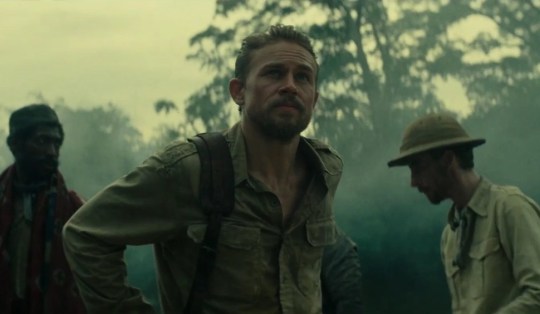
For a movie with a dashing lead who takes multiple expeditions into the Amazon rainforest to find a fabled lost city while facing perilous conditions from treacherous landscapes to hostile natives, The Lost City of Z has been seen by a total of zero people. That’s a shame. This is a movie that reminds us of pulp magazines and classic exploration films of old, promising mystery, intrigue and adventure. The film takes place over several years in the early 1900s and follows Percy Fawcett whose interest in a lost city turns into an obsession and whose multiple trips to find what may not exist threatens his family life and reputation. Directed by James Gray, The Lost City of Z is a refreshing antidote to the modern action film full of CGI and empty noise. The rich cinematography provides a natural and vivid look which amplifies the sense of danger Fawcett and his men must face. And Charlie Hunnam shines as Fawcett, pulling us into his world with his passion and charisma and even when disillusionment threatens these qualities, we remain invested in his struggle to the end.
#10. Mother!
Director: Darren Aronofsky
Starring: Jennifer Lawrence, Javier Bardem, Ed Harris, Michelle Pfeiffer
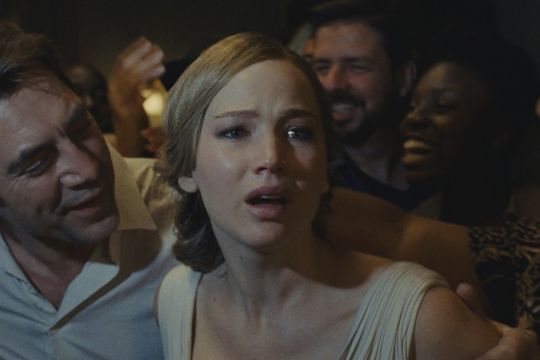
Mother! is undeniably polarizing and that’s understandable. Darren Aronofsky’s films aren’t meant for a mass audience and his use of surrealism can be frustrating at times, but it can also be deeply profound and Aronofsky is nothing if not ambitious. Mother! is perhaps his most challenging film but also one of his most mesmerizing. It starts out relatively calm as we see Mother (Jennifer Lawrence) living with Him (Javier Bardem) in a large country home in what seems like a tranquil existence, albeit with eerie undertones. Things get weird when unexpected guests arrive, played by Ed Harris and a deliciously chilly Michelle Pfeiffer. You think you’re in for a standard thriller until Aronofsky takes us down a wildly unexpected path. Never has a movie escalated so quickly and severely. Toward the end, it becomes a beautifully chaotic mixture of bizarre images and themes that blur the lines between reality and fantasy while grappling with topics from religion and death to the burdens of celebrity and motherhood. It’s a tumultuous journey, but if you suspend your disbelief and accept the mayhem, it’s like nothing you’ve ever experienced.
#9. The Florida Project
Director: Sean Baker
Starring: Brooklynn Prince, Bria Vinaite, Willem Dafoe
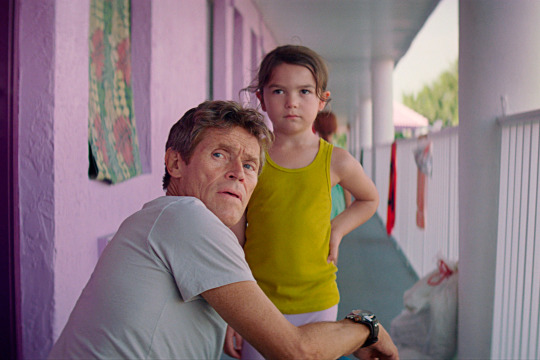
Rarely do movies focus their attention on the poor, uneducated and unfortunate souls we’re introduced to in The Florida Project. But writer/director Sean Baker has decided to observe the beauty and excitement in their lives. Brooklyn Prince, in one of the most impressive performances by any child actor, plays Moonee, who, along with her friends, makes the row of motels that line a street in Kissimmee, Florida her playground. It’s fascinating watching what these children get up to, from the innocent to the questionable to the downright illegal. But, Baker never judges; he merely observes the products of a sad reality. He highlights the joy in their lives while never ignoring their present struggles and the troubling future they probably have in store. Bria Vinaite gives an impeccably raw performance as Moonee’s mother, Halley, who drinks, does drugs, recruits Moonee to resell perfume to tourists and is no more mature than her six-year-old daughter. Willem Dafoe is the manager of the motel in which they reside who’s constantly solving everyone’s problems while unconsciously acting as a father figure at times without being unrealistically portrayed as a saint. Dafoe’s great here. But, it’s Moonee who shines at the end in one of the most emotional and heartbreaking scenes of 2017. Sadly, Moonee may not be destined for greatness, but Prince sure is.
#8. Dunkirk
Director: Christopher Nolan
Starring: Fionn Whitehead, Mark Rylance, Kenneth Branagh
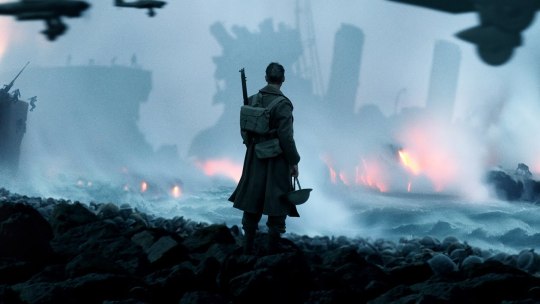
Christopher Nolan is a master of creating spectacles that are as thought-provoking as they are thrilling and Dunkirk is no exception. With the help of Hans Zimmer’s relentless score and many turbulent scenarios, Nolan stresses the utter fear and desperation felt by hundreds of thousands of soldiers evacuating the beach at Dunkirk in 1940 while also highlighting the collective heroism displayed in the process. The film is split into three distinct yet interweaving story lines set on the beach, on the water and in the air, intercut expertly and involving a superb ensemble cast. Nolan’s wise omission of extraneous elements like generals strategizing in war rooms allows the movie to focus on the the event itself, making it a more urgent experience. Even with all the moving parts, we’re guided by Hoyte van Hoytema’s masterful camerawork; what could’ve been a disorienting jumble of images is, in fact, impeccably vivid and coherent, eschewing rapid-fire cuts. But, this is Nolan’s pride and joy and there’s no denying it’s a work of a man so unabashedly dedicated to his craft, one who’s created a breathtaking experience with such a sharp attention to detail that’s at once sweeping and intimate.
#7. The Post
Director: Steven Spielberg
Starring: Meryl Streep, Tom Hanks, every TV actor of the last 5 years
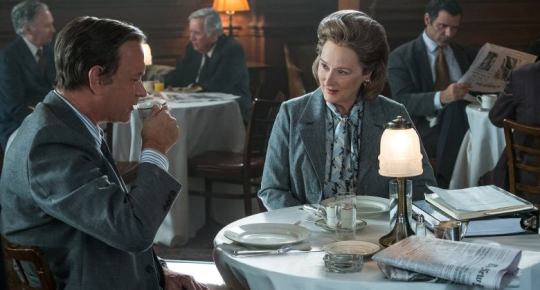
Calling The Post timely isn’t so much an opinion as it is a truism. The parallels between the deceptive presidencies of Nixon and Trump are so painfully obvious that the film couldn’t be timelier. Back in the Nixon era, the Vietnam War was the source of deception which led to the release of the Pentagon Papers detailing more than 20 years of admissions of the failing American war effort, contradicting previous information. The Post is the story of how some journalists decided to print this information, specifically Washington Post heiress and publisher Katherine Graham, Meryl Streep in an Oscar-worthy performance in which she masterfully and subtlety conveys the weight of responsibility on her shoulders regarding a decision with potentially disastrous consequences. Streep makes her anxiety increasingly palpable until it all comes to a head in a powerfully assertive speech. Tom Hanks is great as Post Editor-in-Chief, Ben Bradlee, who’s fairly aggressive about getting the big story and improving his reputation, though Hanks still lets us admire this gruff character for his fierce dedication to journalistic integrity. Also great are the countless TV actors from Bob Odenkirk to Sarah Paulson to, yes, David Cross. As usual, Spielberg does a workmanlike job on the film and adds that elegant, classic Hollywood sheen to the material. He avoids an abundance of exposition, keeps his focus on the human crisis of conscience and allows the proceedings to flow smoothly. This is a very important story about heroes who risked everything in the name of truth and freedom of the press.
#6. Lady Bird
Director: Greta Gerwig
Starring: Saoirse Ronan, Laurie Metcalf, Tracy Letts
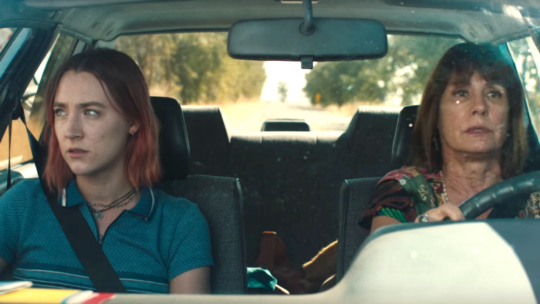
In her directorial debut film, Lady Bird, Greta Gerwig puts a fresh spin on the high school movie without relying on overly quirky characters, gimmickry or excess. Its breezy naturalism helps it transcend the genre with the stripped-down, straightforward and ordinary nature of the movie, paradoxically, making it so complex. A celebration of autonomy and liberation, Lady Bird follows the titular character (Saoirse Ronan) who feels trapped in a mundane life at an all-girls Catholic school in Sacramento with a mother (Laurie Metcalf) who’s mastered the art of passive aggression. But, Ronan turns Lady Bird’s normalcy into a thing of beauty and makes her an embodiment of perseverance in subtle ways. Metcalf is exceptional here too, often ruthless but always sympathetic as the overworked breadwinner of the family. But most of the praise should go to Gerwig, already a great actress and now directing with a gentle and pure touch, allowing the film to breath with little contrivance. She keeps her scenes brief and adds her unique observations and unorthodox comedic sensibilities to the dialogue which is authentic, witty and often shockingly hilarious. This is a smart and insightful film that’s all but devoid of flaws.
#5. Stronger
Director: David Gordon Green
Starring: Jake Gyllenhaal, Tatiana Maslany, Miranda Richardson
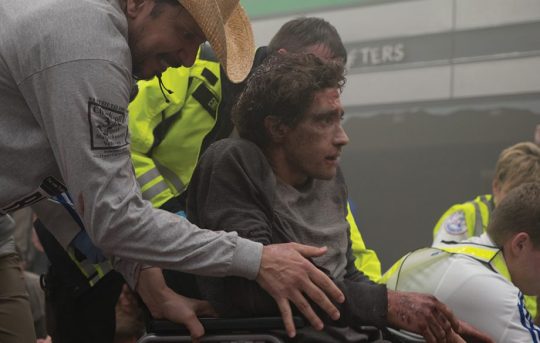
Once again, Jake Gyllenhaal has been snubbed by the Academy. In Stronger, he gives yet another magnificent performance playing Jeff Bauman, an underachieving Boston native who loses his legs during the Boston Marathon bombing while cheering on his ex-girlfriend, Erin (Tatiana Maslany), at the finish line. The movie recounts his rehabilitation as well as the accompanying emotional turmoil he and his family must endure. Movies like this have been done before but rarely with this much brutal honesty. Gyllenhaal is so convincing, making you feel his every ache and bruise; we’re heart broken just watching the poor man trying to enter his bathtub. He completely transforms in front of our eyes from an overeager and fun-loving young man to a bitter, often angry victim with impressive ease. Maslany is equally impressive, wrestling with a multitude of emotions from compassion to guilt to frustration to anger, often simultaneously, in this refreshing take on the ‘caring loved one’ role. In less competent hands, this would be a conventional TV movie full of cliches and sentiment. But David Gordon Green imbues his work with so much realism whether it’s the injury itself, the recovery process, the reactions from friends and family or Bauman’s mental state. It’s a truly inspirational film and meditation on heroism that actually respects its audience.
#4. Three Billboards Outside Ebbing, Missouri
Director: Martin McDonagh
Starring: Frances McDormand, Woody Harrelson, Sam Rockwell
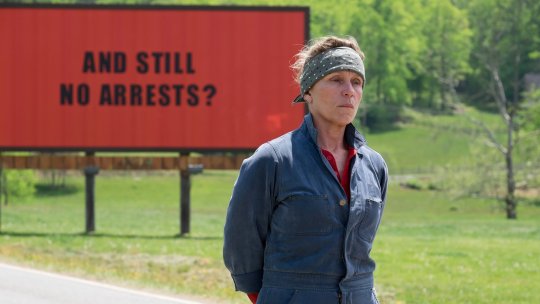
Not only is Three Billboards Outside Ebbing, Missouri timely, but it has one of last year’s most original premises. Enraged by the lack of progress made by the police in identifying the person who raped and murdered her teenage daughter, Mildred Hayes, played by the force of nature that is Frances McDormand, takes action by renting three billboards near her home in Ebbing and posting messages calling out the police for their lack of competence and urgency, especially Chief Willoughby (Woody Harrelson). Obviously, this starts a chaotic chain of events, crafted by writer/director Martin McDonagh, that deals with relevant social issues in a way that’s by turns tragic and shockingly hilarious. But, contrary to the marketing campaign, McDonagh’s film isn’t so black and white; he illustrates the complexity of the matter by exposing fault in all parties involved as well as the tragic consequences of their actions. McDormand shows us an utterly depleted woman with nothing but rage and a mission, making some of the most scathing remarks you’ll hear to anyone in her way, yet still able to sympathize when she sees her adversary in pain, like Willoughby who’s dying of cancer. Harrelson gives an incredibly poignant speech related to this that’s one of the films highlights. Sam Rockwell is also sensational as a racist scumbag of a cop who nonetheless embarks on a path of redemption. The ending is ambiguous. What happens is irrelevant. Whether you think Rockwell deserves redemption is also besides the point. What matters is that there’s a dialogue starting, progress being made and, indeed, something being done. In other words, there’s hope.
#3. The Disaster Artist
Director: James Franco
Starring: Dave Franco, James Franco, Seth Rogan
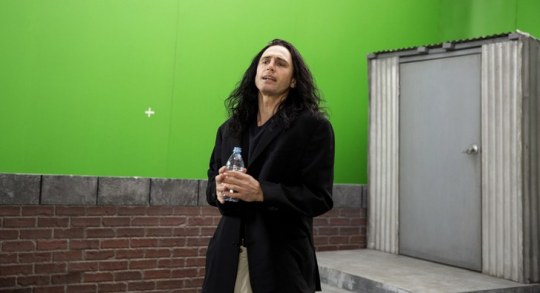
Apparently, James Franco might be a bad dude and shame on him if he is. But, I’m here to talk about movies and The Disaster Artist is a damn good one. Most of the credit should go to writers Scott Neustadter and Michael H. Weber, anyway, for crafting an insightful, hilarious, yet oddly touching screenplay about the wildly misguided Tommy Wiseau (James Franco) who was responsible for The Room, one of the worst movies ever made. We’re oriented by Dave Franco playing The Room star, Greg Sestero, from when he meets the awful but ambitious performer, Wiseau, in an acting class in the late ‘90s through the early ‘00s which sees the pair become friends, move to LA to act, fail miserably and decide to make their own movie. Dave Franco charms as the wide-eyed optimist who’s accepting to a fault. James Franco, still maybe an ass, is great as Wiseau, capturing his voice and mannerisms perfectly, giving us a character who’s as delusional and jealous as he is free-spirited, also to a fault. Their relationship is charming in the beginning and no less intriguing when its threatened by one’s pride and the other’s loss of confidence. The story’s at its best when Wiseau is filming his dream project and we see his lack of talent and leadership grate on cast and crew, specifically Seth Rogen as Sandy Schklair, whose exasperation is priceless. But the film makers are wise to tease without deriding and actually give some credit to Wiseau for, when you think about it, the man accomplished more than most of us ever will, illustrated in a film about a film that moves effortlessly from start to finish.
#2. Wind River
Director: Taylor Sheridan
Starring: Jeremy Renner, Elizabeth Olsen
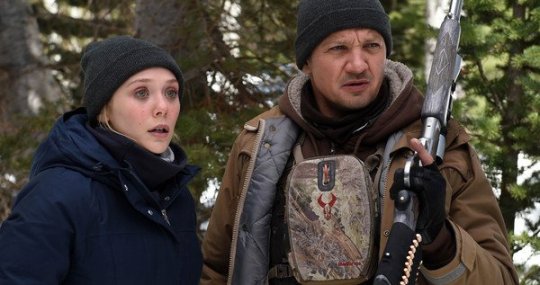
If there’s any justice in this world, Taylor Sheridan soon will be swimming in awards and money for the man is responsible for the scripts of wonderful films like Sicario, Hell or High Water and now Wind River which he also directed. Few people are better at crafting profoundly entertaining commentaries on the dark and controversial pockets of America. With Wind River, he focuses on problems faced by those living on Indian reservations. The film seems like a recipe for a generic crime thriller starring Hawkeye and the Scarlett Witch until you remember Sheridan’s track record and the fact that Jeremy Renner and Elizabeth Olsen are actually great actors. After we’re shown a chilling prelude involving a teen girl running, and collapsing, in the snow in freezing temperatures without appropriate clothing, U.S. Fish and Wildlife Service agent Cory Lambert (Renner) finds the body and gets the narrative wheels in motion. Once rookie FBI agent Jane Banner (Olsen) arrives, they team up to solve the case that takes them to dark and twisted places. Sheridan let’s the film take its time to develop; it progresses clearly and logically, making it easy to follow along, unlike similar films. And unlike these films, you actually care as much about the people investigating the case as the case itself. Though used sparingly, Sheridan composes some of the most realistic and tense action sequences you’ll see. There’s one scene that’s almost unbearably intense but so utterly effective in making you feel the horror this community feels. It, like this film, gets under your skin and stays with you well after the credits roll.
#1. Call Me by Your Name
Director: Luca Guadagnino
Starring: Timothee Chalamet, Armie Hammer, Michael Stuhlbarg
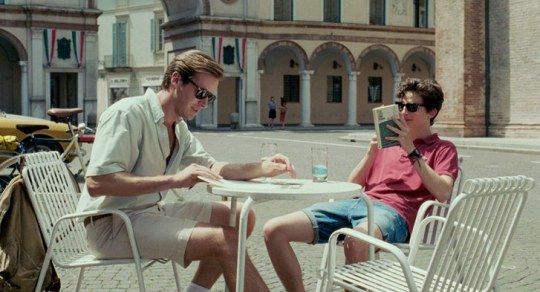
If you consider just how many love stories have been written in the history of humanity, you might think it impossible to create another great one. But what director Luca Guadagnino does with a script from James Ivory is pure bliss. Not only will you fall in love with the characters, but you’ll also fall in love with the gorgeous, picturesque northern Italian countryside on display. It’s here, during a lazy summer of 1983, where an introverted, music-loving Italian-American teen, Elio (Timothee Chalamet), meets an older, classically handsome and outgoing graduate student named Oliver (Armie Hammer), forming a relationship that will change their lives forever. Elio’s father (Michael Stuhlbarg), an archaeology professor, invites Oliver to live with them for the summer to help with his research and although Elio initially is turned off by this ‘intruder’, gradually he forms an attraction. How the film makers deal with this attraction and eventual relationship is simply perfection. The way in which the two characters subtly feel each other out at the start feels so true to life and each subsequent step from attraction to bonding to seduction is equally realistic and even more entertaining.The film benefits from the actors’ fearless performances, especially that of newcomer Chalamet who’s a ball of pent up sexual energy. The movie ends with Stuhlbarg having an irresistibly touching discussion with his son, full of warmth and understanding, and a final heartbreaking scene, so simple in concept yet so emotionally complex. Chalamet takes your breath away here with an array of emotions parading across his face as Sufjan Stevens’ gorgeous ‘Mystery of Love’ plays in its entirety. It’s one of the the most entrancing endings to a movie you’ll see, capping off the best film of 2017.
3 notes
·
View notes
Link
“A female Sherlock? Why not. I don’t care. Sherlockina… it’s coming soon.” The question had arisen because I had been asking Benedict Cumberbatch about his views on the casting of Jodie Whittaker as the first lady Doctor Who – the Timelord saga until recently overseen by Sherlock’s showrunner Steven Moffat. And for the record, Cumberbatch is all for Whittaker in the role. “It’s an alien so why can’t it be a woman?” he says. “I don’t speak as a fan as I just speak as someone who wants to see Jodie Whittaker’s performance as the Doctor. I think she’s an extraordinary actress and we’re lucky culturally to have got her to agree to do it, let alone any debate about whether it’s right or wrong. Just go for it… Let’s see what happens.”
But back to Sherlock, and underlying Cumberbatch’s relaxed attitude to the gender of the person playing the detective with the pipe and deerstalker, I believe I detect an actor who is perhaps subconsciously letting go of the role that made his name. “Maybe…. maybe”, is his not unexpected reply to the eternal question of whether there will be more of the globally popular updating of Arthur Conan Doyle. And while there almost will be further episodes at some point, there is also little doubt that the 41-year-old actor’s energies are flowing in a new direction. In short, he’s become a producer.
SunnyMarch TV was launched by Cumberbatch and associates in 2013, France’s Studiocanal buying a 20 per cent stake last year, and its first major project is about to be seen on BBC1. The Child in Time is an adaptation of Ian McEwan’s 1987 novel centred on a grieving children’s author, Stephen Lewis, whose toddler daughter has been kidnapped from a supermarket two years earlier. However, it’s rather more lofty and metaphysical – as you’d expect from any Cumberbatch-McEwan axis – than the burgeoning canon of more visceral TV thrillers (The Missing and Thirteen on the BBC alone) about abducted youngsters. “Despite the depths it plumbs and the emotional trauma at the centre of it, it’s a story about salvation and hope and trying to build a future that accepts and encompasses the loss of that child”, says Cumberbatch with his characteristic flood of articulateness. “It’s almost an examination of childhood and time and what happens in trauma with time but also reflections and how the conscious and sub-conscious can slide… it got quite a lot going for it other than just that horrific, horrific central premise.”
McEwan is having something of a screen moment, what with the upcoming movie of his novella, On Chesil Beach, and now this – the first TV version of one of the author’s books. Cumberbatch appeared in Joe Wright’s 2007 film of McEwan’s Atonement, but this particular script landed on his producer’s desk. That he himself took the central role of Stephen Lewis was not simply because he wanted to play him but because starring in his own productions is helping get his company off the ground – “To bring attention to the material and get it funded”, as he puts it. Playing an ordinary person, albeit in extraordinary circumstances, the role is also something of a departure for Cumberbatch, a go-to actor for real-life geniuses (Alan Turing in The Imitation Game or Thomas Edison in the upcoming The Current War), arrogant fictional brainy types (Sherlock, Steven Strange), or troubled and/or ambivalent characters like Julian Assange or Hamlet. Cumberbatch would never claim to be an ‘everyman’. “It’s a part that is a million miles away from a lot of the stuff that I’ve done… especially the more famous one on telly”, he says, [referring to Sherlock]. “It was a challenge. I was bringing a lot more of myself as I sound and as I move through the world. It felt quite naked at times, and there were moments when I thought ‘am I doing enough?’. “I wanted Stephen to be close to myself, so I brought a lot of my own wardrobe in because I wanted to feel it was me rather than someone else I was putting on every day. It’s not often you get into a role by getting out of a role.” On the afternoon we meet, Cumberbatch’s wardrobe consists of navy chinos and trainers, white t-shirt and open grey linen shirt – the same outfit, I can’t help but notice, that’s he’s wearing later when he’s snapped by paparazzi as (according to Mailonline) “he enjoyed a date night with wife Sophie Hunter”.
Cumberbatch and theatre director Hunter were married in 2015 after having known each other for 17 years. The couple have two sons, two-year-old Christopher, and Hal, who was born in March. Did parenthood make the role of grieving father in The Child in Time more difficult for the actor? “I don’t think you have to be a parent to understand”, he says. “It wasn’t a case of ‘Oh, great, I can get my teeth into something whereby I’ll be emotionally wrought because I’m a new dad for a second time’. It just happened that way.” He didn’t take the part home with him then? “I try not to do that whatever I’m doing. Those are very separate spaces for me, and you have to take care of yourself. In a way, you’re literally kind of breaking down for a whole day but that’s what the drama demands; it makes you realise what the pain must be like for people who actually experience it. It’s unfathomable, so you don’t really want to bring that into your own domestic space.” Hunter is joining her husband as a producer on one of SunnyMarch’s new projects, a film adaptation of Megan Hunter’s eco-apocalyptic debut novel The End We Start From (“a stunning tale of motherhood”, according to Cumberbatch). Other movies on his production slate are an adaptation of Matt Haig’s How to Stop Time, Geoffrey Household’s 1939 adventure classic, Rogue Male, and Rio, which will co-star Cumberbatch and Jake Gyllenhaal, while TV dramas in pre-production include screen versions of Edward St Aubyn’s Melrose novels. For reasons given above, what connects the productions, apart from their origins in literature, is that they all star Cumberbatch. But what was it like for The Child in Time to also wear the producer’s hat? “It’s different because you’re there at the inception of the idea and just thinking who would be right to direct it… I’ve never been at that stage of things before”, he says. “I really, really enjoyed it. But it’s not without its challenges, especially watching the work sooner than you should as an actor, in a very raw state to then give feedback about what you feel as a producer. That was tricky.” And watching and then critiquing himself? “It’s horrible and very peculiar – the way you look, the way you do things, it’s just horrible. It’s full of hate but there’s nothing better than the self-critic in your head for brutality. “It’s a first time, we’ll see how it works”, he continues. “Everyone had a great experience making it which is a testament to us doing something right as a production team.” The cast of The Child in Time also includes Trainspotting-to-Boardwalk Empire actress Kelly Macdonald (playing Lewis’s estranged wife), Stephen Campbell Moore and Saskia Reeves. Stephen Butchard adapted it. “I’ve been a McEwan fan since I was old enough to kind of understand stuff… I would read the book almost the minute it came out”, says Cumberbatch. “Atonement was the first book [of his] I read and funnily ended up in a few years later. And The Cement Garden was first the first production I went to. There was a production of it being made when I studied it [at Manchester University] and I thought about auditioning for it and then I thought ‘I can’t do that… I’m not a good enough actor.” The Child in Time was one McEwan novel that evaded his omnivorous consumption, however. “I hadn’t read it”, says Cumberbatch. “And there will be expectations from those who know the novel even though it was released in the late 80s. We’ve re-contextualised it and set it in the present day [because] it’s partly a critique of the Thatcherite era.” In the meantime, in another departure for the actor (“Unlike any character I’ve played before”, he promises) it was announced last week that Cumberbatch will be playing the father of gay bare-knuckle-fighter Mikey Walsh in the film Gypsy Boy. And with so much going on you might think that he wouldn’t have time to make another film in the all-star Avengers superhero series, let alone three. However two more of the multiplex blockbusters in the role of Steven Strange have been filmed, with another in pre-production. “I’m very late to the party but it’s just amazing to be part of it. Anything’s possible especially as I can go like that”, he says, clicking his fingers, “and appear anywhere”. He might equally have been describing his future prospects.
#great interview#benedict cumberbatch#interview#the child in time#sophie hunter#sunny march#executive producer#221bcumberb
89 notes
·
View notes
Photo
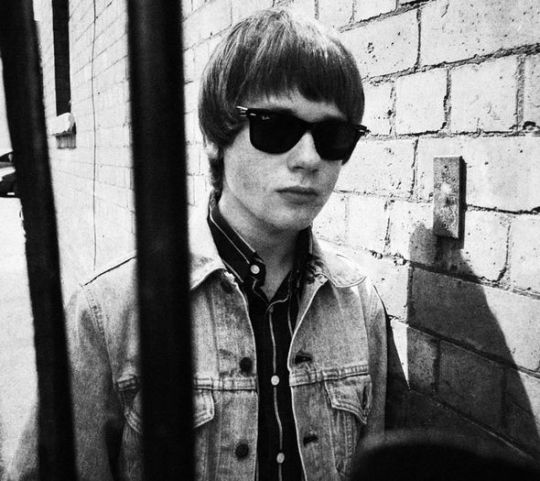
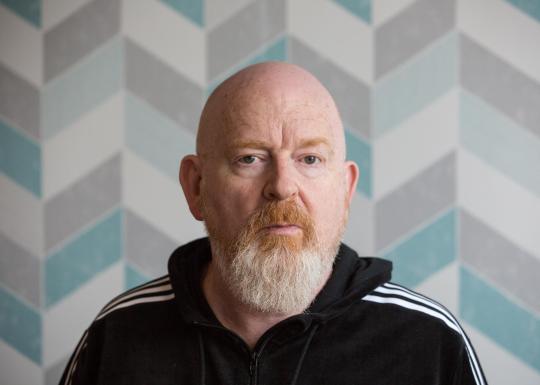
Happy Birthday Alan McGee born 29th September 1960 in East Kilbride.
He grew up in Glasgow and attended King’s Park Secondary School, where he met future Primal Scream founder Bobby Gillespie. McGee left school at 16 with one O grade McGee and Gillespie were heavily into punk rock, and they joined a local punk band, The Drains, in 1978.
McGee went on from there to found a successful club, The Living Room, in London, then buoyed by the success of their club, McGee funded the record label Creation, with two friends. Named after the ‘60s mod rock outfit, Creation Records’ first release was by the Legend! It was a 7" so bad that McGee reportedly hid most of the records underneath his bed, eventually melting them down after a dispute with the band.
He then signed up The Jesus & Mary Chain to his fledgling label. Due to their quite timely sound and some major championing from the star-making NME, the Mary Chain’s “Upside Down” was Creation’s first outright hit single, spending seven weeks atop the U.K. indie charts. Although the band eventually signed to the major subsidiary Blanco y Negro, McGee was able to reinvest the profits which provided them with enough to sign a string of artists who enjoyed success in the Indie charts. Primal Scream’s Screamadelica was a major breakthrough for McGee and the label.
Not the most financially astute man McGee was still losing money, even after he sold 49% of Creation to Sony the signing of bands like Sugar, the Boo Radleys, Teenage Fanclub should have helped but didn’t.
Things only changed when a band from Manchester fronted by a pair of brothers forced their way on-stage at a gig in Glasgow attended by McGee. Impressed by their attitude, he signed Oasis on the spot, resulting in a partnership that would launch both the band and the label into previously unimaginable success. Thanks to the deal in place with Sony, which quickly moved to shape up the anything-goes business style of the Creation offices, Oasis released a series of singles and a debut album that were met with pandemonium across the globe.
McGee a brick wall however when the hectic life of running a successful label and the years of high stress and out-of-control drug use saw him suffering a complete nervous breakdown. He spent the next two years in recovery. He gradually became less and less involved in Creation as Sony executives took over the label.
Alan McGee’s role in shaping British musical culture over the past thirty years is hard to overstate. As the founder of Creation Records he brought us the bands that defined an era. A charismatic Glaswegian who partied just as hard as any of the acts on his notoriously hedonistic label, he became an infamous character in the world of music.McGee continues to have an impact on independent music like perhaps no other, he has been managing bands in recent years including The Jesus and Mary Chain and The Happy Mondays, in 2018 he launched a new record label, Creation23 saying “I want to put records out again…I’ve missed it, 23 is my lucky number”
Bobby Gillespie sums Alan McGee up nicely “McGee was our Malcolm McLaren and Tony Wilson. An instigator and motivator, a born up setter. I’ve never met anyone like him and neither have you.”
McGee’s autobiography, Creation Stories, was optioned by Burning Wheel Productions and has been adapted into a film screenplay by Monday’s birthday boy Irvine Welsh and Dean Cavanagh. Ewen Bremner, best known as Spud in Trainspotting, takes the central role, Danny Boyle is executive producer.
It’s an “okay” film, definitely not of the standard of Trainspotting, but as you would expect with Bremner in the lead role, it raises a few laughs. Richard Jobson plays Alan’s father, Welsh, as usual makes a cameo appearance.
If you want to see the film, you can watch it on the following link https://tinyzonetv.to/movie/watch-creation-stories-2021-fr
11 notes
·
View notes
Text
Just A Bunch Of Movies That People Should See One Day
Alright so I went way overboard but when I set out to make a list of films people should check out I’m gonna take it a little to seriously. That being said here’s a shit ton of films that I think everyone should check out if they can. I’m definitely missing a lot but every single one of these is in order by year of release. So here it goes.
Tagging: @daveeddiggsit @skyeethefallenangel @myminddoesmindactually @aryn-the-wolfheart @princessmeegz @ohbelieveyoume @seekret-fanfic @wosushi @thatgirlwhosalwayssinging @miamorbarba
To start here are some classic films (1900-1930). If you’re a film major (or someone into cinematic history) at one point you’ll watch these or will probably be told to watch these. I’ll bold my personal favorites for anyone who isn’t into cinematic history.
Fire! (1901)
A Trip To The Moon (1902)
The Great Train Robbery (1903)
Rescued By Rover (1905)
The Cameraman’s Revenge (1912)
Gertie the Dinosaur (1914)
The Cabinet of Dr Caligari (1920)
Dr Jekyll and Mr Hyde (1920)
Nanook of the North (1922)
Nosferatu (1922)
The Hunchback of Notre Dame (1923)
Battleship Potemkin (1925)
Metropolis (1927)
Steamboat Willie (1927)
The Passion of Joan of Arc (1927)
Blackmail (1927)
These are some classic Pre and Post War films. (1930-1950)
City Lights (1931)
M (1931)
Freaks (1932)
A Farewell To Arms (1932)
Modern Times (1936)
La Grande Illusion (1937)
Gone With the Wind (1939)
Mr Smith Goes To Washington (1939)
The Wizard of Oz (1939)
Wuthering Heights (1939)
The Grapes of Wrath (1940)
The Great Dictator (1940)
Citizen Kane (1941)
The Maltese Falcon (1941)
Casablanca (1941)
Arsenic and Old Lace (1944)
Double Idemnity (1944)
Hamlet (1948)
Just some quintessential classics from the Golden Era of Cinema. Or so it’s called. (1950-1980)
Strangers On A Train (1951)
Julius Caesar (1953)
The Caine Mutiny (1954)
On the Waterfront (1954)
Rebel Without A Cause (1955)
12 Angry Men (1957)
Vertigo (1958)
Psycho (1960)
West Side Story (1961)
La Jetee (1962)
Lawrence of Arabia (1962)
The Birds (1963)
Bye Bye Birdie (1963)
The Sword In the Stone (1963)
Dr Strangelove (1963)
The Graduate (1967)
2001: A Space Odyssey (1968)
Chitty Chitty Bang Bang (1968)
Easy Rider (1969)
Midnight Cowboy (1969)
A Clockwork Orange (1971)
1776 (1972)
The Godfather (1972)
Young Frankenstein (1974)
Monty Python and the Holy Grail (1975)
One Flew Over The Cuckoo’s Nest (1975)
Taxi Driver (1976)
Animal House (1978)
Alien (1979)
Apocalypse Now (1979)
And finally here are some modern classics (and some films which will soon be considered modern classics) (1980-2016)
The Elephant Man (1980)
The Shining (1980)
An American Werewolf In London (1980)
Blade Runner (1982)
Tootsie (1982)
The Outsiders (1983)
1984 (1984)
Amadeus (1984)
The Black Cauldron (1985)
The Breakfast Club (1985)
Blue Velvet (1986)
Ferris Bueller’s Day Off (1987)
The Princess Bride (1987)
The Untouchables (1987)
Beetlejuice (1988)
Dangerous Liaisons (1988)
Rain Man (1988)
Bill & Ted’s Excellent Adventure (1988)
Dead Poet’s Society (1989)
Glory (1989)
Edward Scissorhands (1989)
Flatliners (1989)
Goodfellas (1990)
Barton Fink (1991)
The Silence of the Lambs (1991)
Chaplin (1992)
Of Mice and Men (1992)
Reservoir Dogs (1992)
In the Name of the Father (1993)
The Nightmare Before Christmas (1993)
Schindler’s List (1993)
Clerks (1994)
Natural Born Killers (1994)
Pulp Fiction (1994)
Quiz Show (1994)
Empire Records (1994)
Seven (1995)
The Usual Suspects (1995)
Fargo (1996)
Primal Fear (1996)
A Time To Kill (1996)
Trainspotting (1996)
Gattaca (1997)
Wag the Dog (1997)
Can’t Hardly Wait (1998)
Rushmore (1998)
The Truman Show (1998)
Velvet Goldmine (1998)
Being John Malkovich (1999)
eXistenZ (1999)
Fight Club (199)
Galaxy Quest (1999)
The Talented Mr Ripley (1999)
Spring Forward (1999)
Almost Famous (2000)
American Psycho (2000)
Donnie Darko (2001)
Equilibrium (2002)
Danny Deckchair (2003)
Kill Bill Vol 1 (2003)
Timeline (2003)
Dear Frankie (2004)
Garden State (2004)
Corpse Bride (2005)
Hitchhikers Guide to the Galaxy (2005)
V For Vendetta (2005)
The Prestige (2005)
Marie Antoinette (2006)
August Rush (2007)
No Country For Old Men (2007)
Zodiac (2007)
There Will Be Blood (2007)
Juno (2007)
Lars and the Real Girl (2007)
Charlie Bartlett (2007)
The Curious Case of Benjamin Button (2008)
RocknRolla (2008)
21 (2008)
Definitely, Maybe (2008)
Moon (2008)
District 9 (2009)
Brothers (2009)
The Road (2009)
The Trotsky (2009)
Inception (2010)
Easy A (2010)
The King’s Speech (2010)
Midnight In Paris (2010)
Warrior (2011)
We Need To Talk About Kevin (2011)
The Ides Of March (2011)
Hanna (2011)
Moonrise Kingdom (2012)
Lawless (2012)
The Hunt (2012)
Seven Psychopaths (2012)
Prisoners (2013)
Locke (2013)
Inside Llewyn Davis (2013)
Interstellar (2014)
Room (2015)
The Lobster (2015)
Chappie (2015)
Me and Earl and the Dying Girl (2015)
Silence (2016)
Brimstone (2016)
Captain Fantastic (2016)
Yeah. I went way overboard. But like I said. I love movies and I know I left a lot out. This list would have been way longer.
#movie recs#movie recommendations#I MAY HAVE TAKEN THIS A LITTLE TO SERIOUSLY#BUT I LOVE MOVIES SO WHO CARES
606 notes
·
View notes
Text
Train-Spotted (Katlaska) - Puck
A/N Hey everyone! Long time no see. Things got a little crazy for me with both personal stuff and university, but now I’ve got a bit more free time. So here you go, a brand new fic. If you’d like this to turn into a chaptered fic please let me know, I have places for this to go. (And yes, the title is a play off of Trainspotting.) I’ve never written Katlaska before, but I figured I’d give it a go. Cheers!
Summary: A recently sober Katya enjoys taking long metro rides to nowhere. One morning she runs into a fellow queen that she’d had a one night stand with about a year ago, before she’d gotten sober. Drag Queens but not Ru Girls.
Brian had never complained about public transit. Not once. Trains could be loud and hot and smelly, but Brian loved every second of every train ride. That may have been a bit of an exaggeration, but regardless, he’d chose to take the bus or the train over an uber any time. People lived out their lives on trains. People got engaged, broke up, traveled to interviews for their dream jobs, headed home after being fired with boxes filled with office-appropriate pieces of themselves. Every part of human existence (the negatives and the positives) had happened on a train at some point. And for just a few dollars, you could get a front-row seat. The Metro here in LA wasn’t as busy as The T had been back in Chicago, but maybe that was better. Instead of learning little bits and pieces about the 35 people crammed into the same small car, you could learn a lot about the 18 people. Sometimes they would even reply when Brian said hello.
Not today though. People on a train at 6:05 am were rarely talkative. People on 4:16 am trains were better. Most people on the 6:05 were heading to offices, and something about that particular commute fogged over the eyes of the trains passengers. Despite the ungodly hour, there was no detachment in the eyes of people on the 4:16. They were always headed some place interesting. Construction workers, heading off to build homes for the entitled assholes who rode the 7:02 train (hotshots were always above taking a 6:05). A Baker who was in the process of making a wedding cake for a woman who worked for a “Traditional Marriage Advocacy Group” had told him that he’d got a lot of satisfaction out of using his little gay hands to mix the cake batter while wearing his extravagantly homosexual engagement ring. (Brian had gotten the guy’s number, and had a threesome with him and his fiance a couple days later.) A nurse headed home after losing a patient (An old woman who’d tried to prove to her son that she could walk a tightrope). Brian had met some interesting people on later trains of course, but the 4:16 train was always his favourite. But today just happened to be a 6:05 day.
Brian was rarely headed anywhere important when he took morning trains. He’d make up a destination as he went along. He was usually heading back from somewhere, or heading out again to ride the trains to clear his head. A mix of drag and bartending kept him out late, and a mix of anxiety, insomnia, and attempts to get sober kept him out of the house in the wee hours. But it was always interesting to talk to people who were headed somewhere interesting, instead of just leaving something behind.
Last night had actually been a relatively good one, as far as Brian’s nights went. He’d had the night off work so he’d gotten to perform his drag, and the crowd had been fan-fucking-tastic. Not a bachelorette party in sight, and he was pretty sure he could feel a dollar bill glued to his back with sweat that he’d missed when de-dragging. He’d kept substance-free, and gotten to make out with a solid 8 during his performance. Sadly he’d missed getting the 8’s number. Now Katya’s gear had been safely dropped off at home, and he was on his way to the 4th street bridge to watch the sunrise.
There was a rough lurch, then a loud “ding” as the doors to the train slid open. A series of people filed through the bottleneck between the open doors, distributing themselves in predictable patterns through the car. Brian barely suppressed a smile. This round of passengers seemed a little more interesting than the usual 6:05 crowd. Their eyes were closer to a 12:48 train, though more sober. He scanned his eyes over them one by one, picking up little bits of information. There was a man in an ill-fitting brown suit (too broad at the shoulders and too short), but his hair was slicked back so forcefully that it looked wet, and the way that he drummed his fingers against his briefcase told Brian that he was probably on his way to his first day at a new job. Something corporate, in an office building that still looked like it was stuck in 1970. (Brian rarely got to find out if he was right about his musings, but the fun part was creating the story.)
There was a woman whose dress shirt was a little rumpled, as though she had worn it the day before. She’d slept over at someone else’s house the night before, Brian decided, but it hadn’t been planned and she isn’t planning on telling anyone about it either. She probably slept with another female coworker, the one who works in the cubicle next to her, and she’s still in denial that she’s bisexual.
There was a man with brown hair and a long face, his eyes halfway shut and his mouth curled into a lazy smile. Brian thought he could see some light black smudges beneath his eyes. Makeup. Definitely makeup. Brian probably had the same smudges under his eyes (or even more makeup remnants than that, he was always lazy about taking it all off). He’s probably been performing the night before too, but at a different club. He tried to picture what the guy must look like all dragged up, and for some reason Brian’s mind settled on extra large padded hips to offset the guy’s skinny frame, and a messy blonde wig…
Shit, Brian totally knew him. This was…
Fuck, he couldn’t remember his name.
He definitely had a blurry picture in his head, and the ghost of a nasal, drawling voice…
The guy happened to glance in Brian’s direction, and Brian saw a glint of recognition in his eyes. The man’s lips slid smoothly into a broader smile, and…
Oh – that did it.
Alaska. Her name was Alaska. They’d both performed at a WeHo Hamburger Mary’s a couple of months back. They’d ended up doing an impromptu group number, then doing each other back at Brian’s old apartment. Brian couldn’t remember if he’d learned Alaska’s real name, they’d probably stuck to drag names the full night. Or maybe Brian had been too high too high to remember. Both options were equally plausible. Another benefit of sobriety to add to his list (a sticky note on his fridge).
Should he go over? He wasn’t sure. He’s made friends with a lot of people he’d slept with (and slept with a lot of people he was friends with), but not usually after not seeing them for a year. Plus he was pretty sure something weird had happened afterward, but he wouldn’t be able to figure out what it was if Divine herself popped up from Hell and held a gun to Brian’s pussy.
But maybe he was wrong? Maybe nothing weird had happened. He was fairly certain something had, but to be fair most things he did were a little weird.
Fuck it, he should talk to him.
Alaska looked away from Brian, glancing up at the map above the doors. Shit, no, Alaska clearly wasn’t interested in talking. Brian should stay exactly where he was.
Alaska looked away from the map to glance back at Brian, who felt his stomach drop. Jesus, Brian groaned internally, as if he was a teenage girl. Why was he feeling so nervous? He was never this nervous. Ok, not true. He was the most anxiety-plagued person he’d ever met. But not about this sort of thing. Sex was one of the few things he never worried about.
And fuck, now Alaska was heading over.
The way the man moved was achingly familiar. Even though he was out of drag, there was still a sway in his hips when he walked, and his eyes remained fixed on Brian. The aftermath of the last time he’d been pinned under Alaska’s gaze flicked through his mind on repeat, and his throat went a little dry. The picture was a little unclear with a few frames missing, but the general storyline was enough. God that had been some good sex.
Alaska slid over to him and sat down. Not next to Brian, but on the bench across from him. Brian was grateful for the space. Not that he wouldn’t have minded being pressed up against Alaska again, but the situation was awkward, so the aisle between them was like a protective no man’s land.
Ian McKellen had been great in that play.
Fuck, he was rambling in his own head. He really was fucking nervous.
Alaska still hadn’t said anything, maybe he was waiting for Brian to start the conversation to make sure Brian recognised him. Brian licked his dry lips and opened his mouth without knowing what he was planning on saying, but thankfully Alaska seemed to sense Brian’s panic and spoke first.
“Hey.”
Fuck, why hadn’t he thought of saying that? This was a mess, Brian hadn’t even been able to think of starting a conversation with “hey”. What the hell was going on with him?
“Hi.” Brian replied with a genuine smile. See? He could be calm. And think of something on his own too, not just rely on repeating Alaska’s “hey”.
“Fancy meeting you here.” Alaska drawled like a Golden Era film star. His curled smile grew until it matched Katya’s.
“Yeah.” Katya laughed dryly, rubbing the back of his neck. “It’s been a while, hasn’t it?”
“Pretty sure it’s a year.” Alaska nodded. “You still living in that lovely apartment?”
He was teasing him. That apartment had been a shit hole.
“Unfortunately no.” Katya sighed dramatically. “I’m in a one bedroom now, I figured it was time to stop making a roommate put up with my insanity.”
“That’s too bad, I liked the place.” Alaska said, giving a small shrug. “And your roommate was funny.”
“I’ll never tell him you said that, he doesn’t need the ego boost.” Katya grinned. He’d forgotten that Alaska had met Tracey. Brian should call him, maybe he would know whatever weirdness Brian couldn’t remember. “What about you, you still performing at Hamburger Mary’s?”
“Headlining.” Alaska admitted with a thin layer of pride.
“Well look at you! Moving up in the world!” Katya said.
“And you, you still at Los Globos?” Alaska asked, leaning forward ever so slightly.
“Yep.” Katya nodded. “But a bartending gig has opened up at Showgirls, I was thinking of going for it. If I can get an in there I might be able to get on their stage.”
“Oh you’d do great at Showgirls.” Alaska grinned. “Give some of those Ru Girls a run for their money.”
“Oh please.” Katya scoffed.
“If you’re too intimidated then by all means, leave it to the professionals.” Alaska said with a wave of his hand, his eyes gleaming. “From what I remember you really weren’t shy about much.”
“And from what I remember you enjoyed that.”
Were they flirting? This felt like flirting. Brian was definitely grinning the way he did when he flirted, and they were both leaning forward, their elbows resting on their thighs.
He remembered Alaska’s thighs. Or more specifically, remembered biting them until he left marks, which he remembered Alaska liking a fair bit.
From the looks of things, Alaska was remembering something similar.
“Katya…” Alaska said coolly, and the way his tongue curled around Brian’s name raised goosebumps. Like most people in LA Alaska said it “Kah-Tee-Ah” instead of “Kah-Tyah”, but Brian had never really cared how people said it. And as long as he kept saying it like that Alaska could pronounce it however he damn well pleased.
“Yes?” Brian replied, leaning forward a little further.
“Are you seeing anybody?”
Brian let out a huff of surprise.
“No, I don’t really do that sort of thing.” He admitted, but according to Alaska’s smirk that was the right thing to say.
“Neither do I.”
Brian licked his lips again, and raised an eyebrow at Alaska. Alaska raised an eyebrow right back before leaning back into his seat and crossing his legs.
Alright, clearly Brian needed to make any sort of move here, if a move was to be made.
“Brian.” He said, sticking out hand for a shake.
Alaska reached out and took his hand, but instead of shaking it he laced their fingers together.
“Justin.”
“Nice to see you again, Justin.” Brian replied, giving Justin’s hand a gentle squeeze. “Would you like to-”
“Yes.” Alaska– Justin, replied, and his smile returned.
“Great.” Brian smiled back.“Can I get your number?”
The train lurched again, and their hands fell apart. Justin quickly stood up.
“Nope.” He said, heading towards the doors. “Find me on Facebook.”
“A challenge, I like it.” Brian replied, watching Justin leave and doing his best not to stare at his ass.
“Bye Brian.” Justin called back with a little wave, watching Brian through the windows as the doors closed.
The train pulled out of the station.
Brian could feel eyes on him. He supposed that, objectively, that had been a pretty interesting encounter. At least by 6:05 standards. He pulled out his phone. No bars. At least now he had a reason to get off the train.
#katya zamolodchikova#alaska thunderfuck#katlaska#au#fluff#puck#tw drug abuse#tw mental illness#rpdr fanfiction#canon compliant#trainspotted
60 notes
·
View notes